Interview with Veronica Baas (De Balie)
With this year’s edition of the European Literature Night coming up soon, we have asked Veronica Baas, the programme editor of the event, a few questions about working with the Dutch Cluster of EUNIC. Read the interview below to get an insight into Veronica’s role in the Literature Night and the collaboration between De Balie and EUNIC Netherlands.

1.What role do you play in your organization?
De Balie is a centre for arts, debate, culture and politics at the heart of Amsterdam’s cultural district. As a programme editor, I am responsible for three or four evenings a month, in which we tackle a topic of societal or artistic relevance. I do so by inviting interesting speakers, making sure that authors, politicians or experts are able to tell their story in the best way possible and enabling the audience to engage with them.
2.How do you contribute to EUNIC Netherlands, particularly to the European Literature Night?
Together with the EUNIC Netherlands team we have decided on an exciting theme of the evening – this year, we chose The writer as traveler. Then, all the interested member institutes invite an author from their state that they think will suit the theme. Together with the EUNIC team, we then came up with a dynamic subdivision of the evening. Who will give a talk, who will read poetry, who will have a conversation together? The next step is speaking with all the participating authors, so I can prepare the interviews.
3.What parts of working with EUNIC Netherlands do you enjoy the most?
Of course, I really like collaborating with the EUNIC team. Also, it is really great to be introduced to wonderful writers that you would otherwise not be introduced to so quickly, like a Moldovan author or a writer from Malta. Through these networks, new worlds are really opening up, and that is wonderful.
Interview with Yuliia Malynovska (Embassy of Ukraine)
In this special interview, Yuliia Malynovska discussed the collaboration between Ukraine and the Dutch cluster of EUNIC, highlighting the value of culture in the shared mission of the embassy and the Ukrainian community in the Netherlands. Read on to get a glimpse into Ms. Malynovska’s role in the Embassy of Ukraine and her vision of the European cultural community.
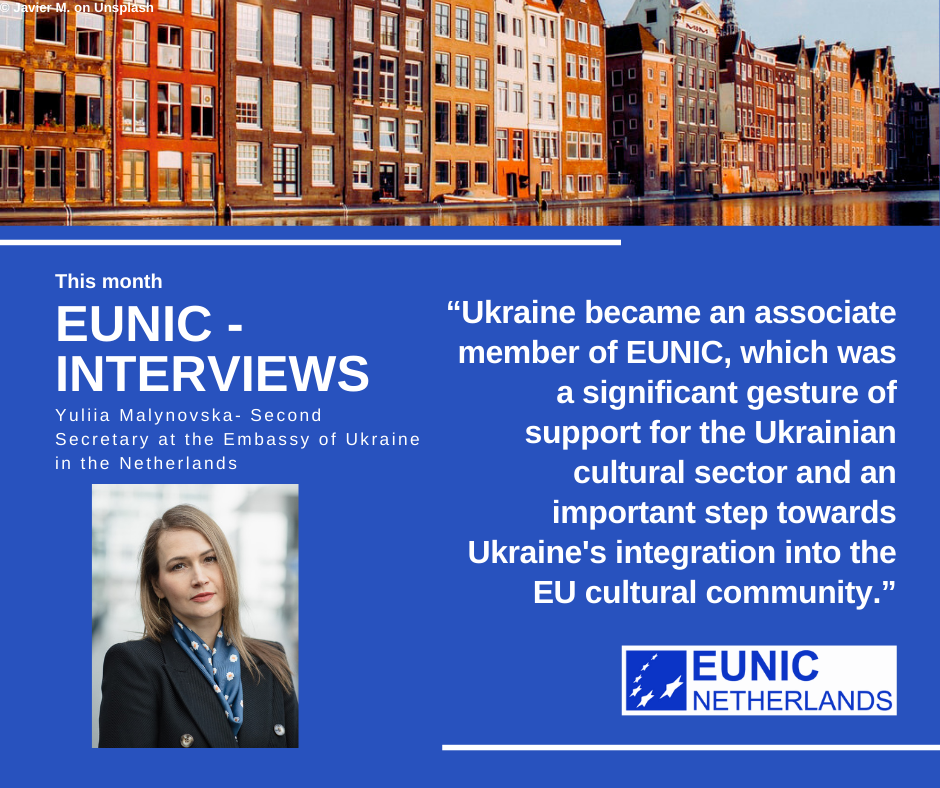
1. What role do you play in your Embassy?
I am responsible for cultural and educational cooperation, communication, and interaction with the Ukrainian community at the Embassy of Ukraine in the Netherlands.
At this difficult time for Ukraine, one of the main goals in my job is to attract support for Ukrainian culture, develop projects on the protection of Ukrainian cultural heritage, as well as assist in preserving the Ukrainian community’s cultural identity.
Also, I’m focused on implementing projects that promote, introduce and familiarize Dutch society with Ukrainian culture while also creating opportunities for Ukrainian artists to establish partnerships with local and European cultural organizations.
A significant part of my activity is devoted to strengthening cooperation in education, supporting Ukrainian students, and developing the network of Ukrainian schools, cultural centers, and volunteer initiatives in the Netherlands.
My colleagues and I, being part of the embassy of the country in war, take extraordinary actions, everything possible to attract as much support for our country and people as possible in every field of our activity. We are all working together as a coordinated mechanism – the embassy, the Ukrainian community in the Netherlands, Ukrainian experts, scientists, and cultural figures – towards our common goal: victory for Ukraine.
2. How do you contribute to EUNIC NL?
Approximately two years ago, Ukraine became an associate member of EUNIC, which was a significant gesture of support for the Ukrainian cultural sector and an important step towards Ukraine’s integration into the EU cultural community. Since then, the Embassy has been actively participating in EUNIC NL cluster activities.
I am delighted that Ukrainian teachers have been representing the Ukrainian language for three years in a row during the European Day of Languages events. Ukrainian writers also take part in the European Literature Night program. Moreover, the Embassy of Ukraine is pleased to participate in and support events organized by EUNIC NL members. We are excited to showcase Ukraine’s cultural identity in various ways as well as contribute to the discussion of common cultural topics, such as fair practices in the cultural sphere, environmental sustainability, etc.
3. What is your favourite part about being a EUNIC NL member?
I feel privileged to be part of EUNIC, where I work alongside friends and like-minded people towards preserving our European culture and the identity of each cultural community. I appreciate how our collaboration is based on shared interests and resources, reflecting both unity and diversity. Although Ukraine’s cultural sphere is only beginning to explore opportunities for interaction with EUNIC, it has already actively participated in many cluster events. And I am confident that this collaboration will only grow and strengthen.
Interview with Matthew Grima (Embassy of the Republic of Malta)
For the first interview of the year, we have asked Matthew Grima, the Deputy Head of Mission at the Embassy of the Republic of Malta in The Netherlands, to share his thoughts about his role in EUNIC NL. You can read the interview below!

1. What role do you play at your institute/embassy?
At the Embassy of the Republic of Malta to the Netherlands, I occupy the role of Deputy Head of Mission. In essence this means that on a day-to-day basis I deal with a wide range of issues ranging from multilateral and bilateral matters, consular issues, administration, and cultural promotion.
2. How do you contribute to EUNIC?
Having joined Malta’s Mission in the Hague last summer, I still consider myself as a fairly new member of EUNIC Netherlands. Nonetheless, through the positive dynamic within the group, and the innovative ideas of fellow members, getting acquainted and inspired by EUNIC’s mission was quite a straightforward transition.
The very first event which I participated in was a Speak-Dating event organised by EUNIC on the occasion of the European Day of Languages. While my contribution was focused on the Maltese language, it was remarkable to witness how the joint participation of different members of the EUNIC Dutch cluster can truly forge a celebration of European Languages, while also showcasing the diverse and rich range of European linguistic and cultural heritage.
As a starting point in our continuous efforts to identify areas through which Malta can effectively contribute to EUNIC’s mandate in the Netherlands, last December, the Embassy of Malta, was honoured to host the EUNIC Netherlands monthly Cluster Meeting.
Following last year’s joint-efforts and contributions to outline EUNIC’s strategy for the coming years, the Embassy is now eagerly expecting the adoption of the new Dutch Cluster EUNIC Strategic Framework. Through the priorities which are being identified, we are looking forward to contribute by enhancing Malta’s participation and contribution within EUNIC.
3. What is the best aspect about being a EUNIC Netherlands member?
Being a EUNIC Netherlands member is an excellent opportunity to serve on a platform which stimulates sustainable artistic creativity and instigates cultural exchanges and cooeration through a wide range of artistic mediums. Within this context the best aspect is that through cultural ties across Europe, it is possible to enhance synergies within our societies through the celebration of diverse cultures and artistic forms.
Interview with Romrawin Petchyotin (Anfield) (EUNIC Intern)
As 2023 is coming to an end, we are delighted to share our final interview of the year featuring Romrawin Petchyotin (Anfield), our dedicated intern at EUNIC Netherlands for the past six months. Dive into the complete interview to discover Anfield’s contributions to EUNIC Netherlands and the valuable experiences she has gained during her time with us.
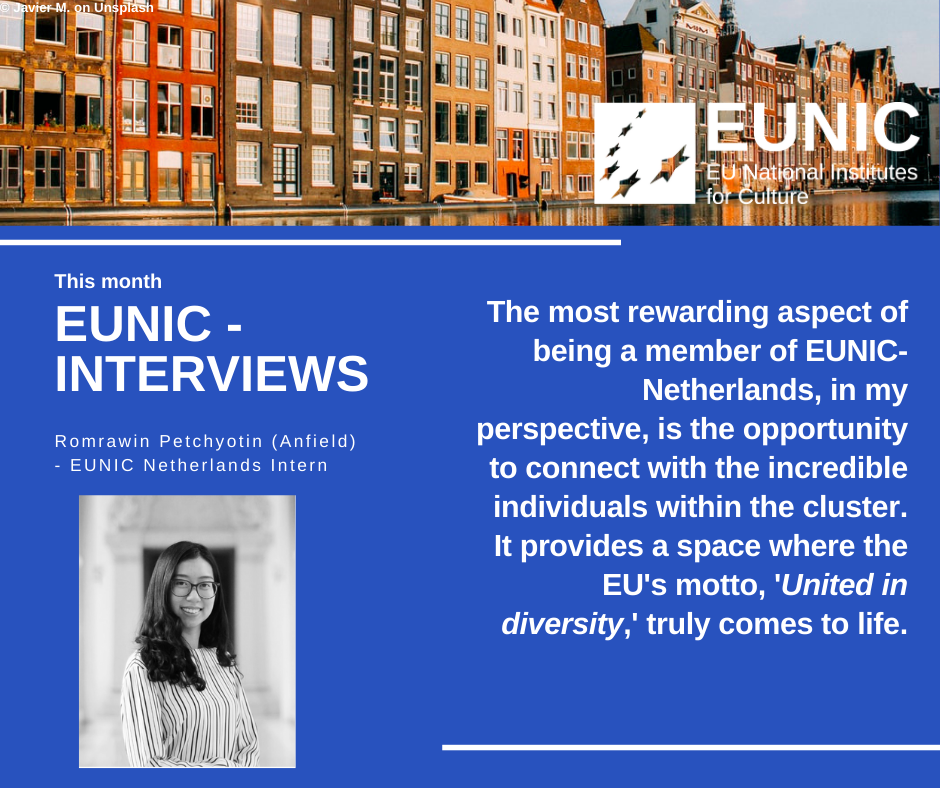
1. What role do you play at your institute/embassy?
I started my internship with EUNIC Netherlands in July 2023. In broad terms, my role involves ensuring the smooth operation of the cluster, in collaboration with the secretary and board members. As our members are from different institutes and are scattered throughout the Netherlands, I see my role as a facilitator, ensuring that communication reaches all members in a timely and accurate manner.
2. How do you contribute to EUNIC?
I contribute to EUNIC in three main areas: administrative, communication, and events. In my administrative role, I ensure the smooth functioning of the cluster by managing calendars, taking minutes, and coordinating with partners for monthly events. I have also actively participated in strategy sessions to develop the new strategy for 2024-2027.
For communication, I oversee EUNIC NL’s online presence and promote both our events and our partners’ events through various channels. Additionally, I provide communication support for key events such as the European Days of Languages and FAIR P(L)AY 3, as part of the Events function.
3. Are there any specific skills or experiences from your background that you believe make you a valuable member of EUNIC Netherlands, and how do you plan to leverage them?
Prior to beginning my Euroculture Master’s in the Netherlands, I was working in the Press and Information section at the EU Delegation to Thailand. During this time, my primary responsibility was promoting European culture within my home country through events and social media initiatives. This hands-on experience not only deepened my understanding of European culture but also equipped me with tangible skills that I bring to my role at EUNIC Netherlands.
Specifically, my skills in social media management and video editing, honed during my previous position, has proven valuable in contributing to EUNIC’s projects. An example is the creation of the FAIR P(L)AY #3 recap video, where I utilised my video editing skills to effectively convey the main take away of the event.
4. What is the best aspect about being a EUNIC-Netherlands member?
The most rewarding aspect of being a member of EUNIC-Netherlands, in my perspective, is the opportunity to connect with the incredible individuals within the cluster. Witnessing how they challenge and embody European culture, observing their passion, and observing how they channel that enthusiasm into their EUNIC work is truly inspiring. European culture, as they demonstrate, is dynamic and ever-evolving, requiring constant redefinition and innovative approaches for effective public promotion. EUNIC serves as a valuable platform for members to convene and engage in discussions on these matters. It provides a space where the EU’s motto, ‘United in diversity,’ truly comes to life.
Interview with Eva Monnier (Institut Français Netherlands)
This month, we’re thrilled to bring you an exclusive EUNIC interview with Eva Monnier, Deputy Cultural Attaché at the Institut Français Netherlands! Dive into her world as she shares insights about her role at the Institut Français, her impactful contributions to EUNIC, and the unique resonance she finds as a bicultural individual within the EUNIC community.
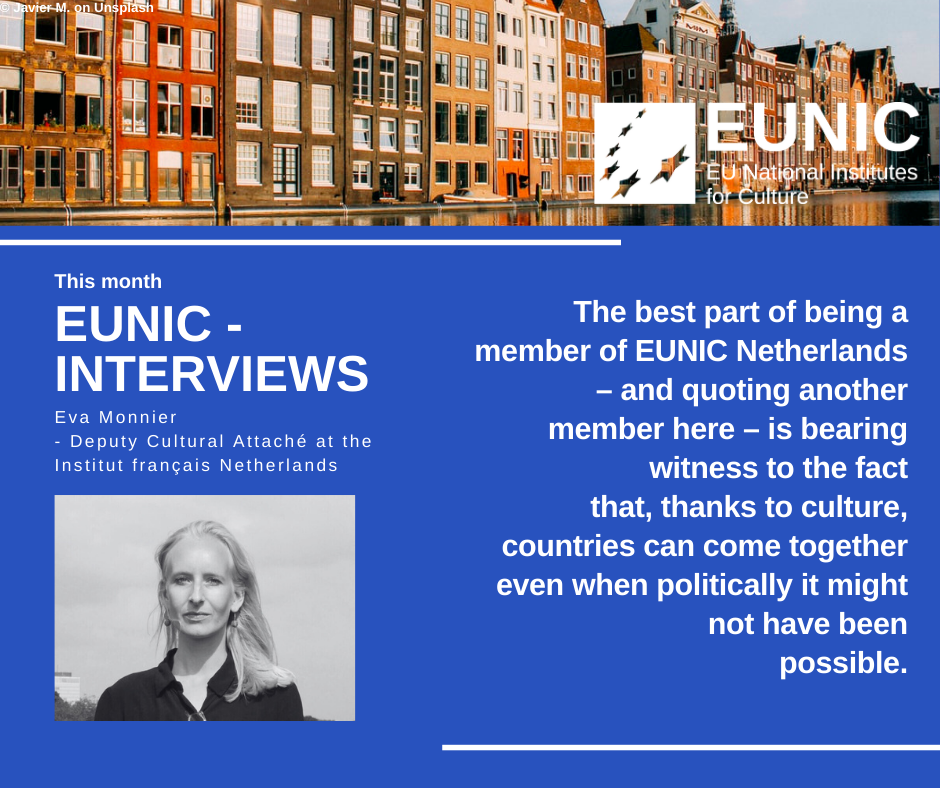
1. What role do you play in your institute/embassy?
I work as Deputy Cultural Attaché at the Institut français NL, within the French Embassy in the Netherlands. The Institut Français NL serves as a bridge between the French and Dutch cultural scenes, fostering and facilitating French-Dutch cultural cooperation in creation, research, and education.
My role, alongside my team in the artistic and cultural department, is to strengthen the position of the French creative and cultural sector in the Netherlands and to encourage dialogue addressing contemporary issues between French, Dutch, and European societies. This includes, identifying collaboration opportunities; connecting creators, professionals, institutions, and territories; stimulating the development of new partnerships; and building lasting relationships between our two countries.
To achieve these goals, we develop flagship projects, from mobility and grant programmes to public debate and professional events, revolving around strategic axes of both bilateral and European cooperation. These encompass crucial themes such as the issues of provenance and restitution, the challenge of ecological transition in the cultural and creative sector, the question of sustainable remuneration practices for artists and cultural workers, and the future of translation in the French- Dutch context.
One concrete example of a new programme I am currently coordinating in partnership with various Dutch stakeholders is the Nouveau Grand Tour in the Netherlands. This programme is an ambitious European artist-in-residency initiative supporting the development of young French artists seeking to advance their careers on an international scale. It involves a network of innovative art residencies that redefine the professionalisations of creators and makers.
Finally, we inform our overseeing authorities in Paris, the Ministry for Foreign Affairs, the Ministry of Culture and the Institut Français, about Dutch cultural policies and, conversely, we inform Dutch institutions about developments in the French art and cultural worlds.
2. How do you contribute to EUNIC?
The Institut français NL is a proud member of EUNIC Netherlands. In my role, I was specifically involved in the working group dedicated to organising the third edition of the FAIR P(L)AY series presented during the Dutch Design Week in Eindhoven.
For this edition, the Institut français NL had the pleasure of inviting Wendy Owusu, a French designer and graduate of the Design Academy Eindhoven whose work has been exhibited at prestigious institutions such as the Nieuwe Instituut in Rotterdam and the Stedelijk Museum in Amsterdam. Within this framework, Wendy shed light on practical challenges faced by young graduates. These included issues such as tax payment, the (dis)advantages of working freelance, and the pros and cons of working for free.
Working closely with Anfield, the current intern at EUNIC Netherlands, my task for this event encompassed coordinating communication activities. Leading up to the event, this involved drafting texts and creating visuals, mobilising partner networks, monitoring social media platforms, aiming at gathering both emerging and established designers to engage them in this European-scale conversation. Post-event, our efforts focused on highlighting the insights from the discussion and collecting feedback and data to measure the impact of the event.
Additionally, I contributed to brainstorming meetings for the development of the new EUNIC Netherlands strategy. These are pivotal and valuable moments, fostering the exchange of ideas and perspectives, where we collectively reflect and redefine our purpose, strategic objectives, and the common values we wish to uphold.
3. What is the best aspect about being a EUNIC Netherlands member?
The question I am most frequently asked as a French-Dutch individual is whether I feel more connected to one culture than the other. I believe any bicultural person would relate to the difficulty of answering this question. It’s almost impossible because eventually one becomes the place of an endless back and forth, dialogue, exchange, between the two cultures that eventually merge to become one.
While it might sound a bit far-fetched, I like to compare EUNIC Netherlands to this idea. It’s a crucial platform for intercultural dialogue, a tribute to diversity and complexity, a cultural space where common European interests are more important than national interests. The best part of being a member of EUNIC Netherlands – and quoting another member here – is bearing witness to the fact that, thanks to culture, countries can come together even when politically it might not have been possible.
Interview with Jonas Radunz (Goethe-Institut Rotterdam)
EUNIC’s spotlight this month shines on our member from Goethe-Institut Rotterdam, Jonas Radunz, who is currently part of his traineeship at the Goethe-Institut worldwide. Join us as we explore Jonas’s role within EUNIC Netherlands and discover the exciting elements from Goethe Institut that he plans to bring to our network!
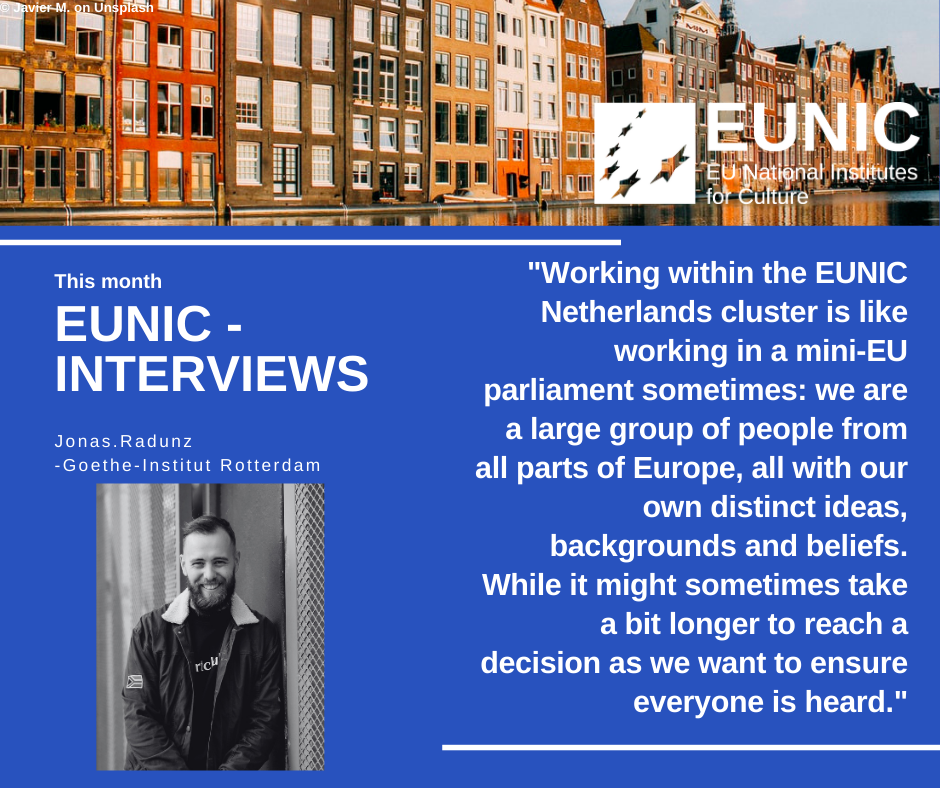
1. What role do you play at your institute/embassy?
I am currently working for one year at the Goethe-Institut Rotterdam as part of my traineeship at the Goethe-Institut globally. This means I’m involved in all the different activities we do, from German language programmes to projects in the library and arts and culture sectors. My goal is to learn as much as I can during this one year, to be best prepared for my upcoming leadership role in the organization.
2. How do you contribute to EUNIC?
Personally, I have been able to assist with our latest event in the “Fair P(l)ay” series at Dutch Design week in Eindhoven and with support for the monthly EUNIC cluster meetings. From an organizational perspective, the Goethe-Institut has a strong interest in fostering European connections at every location that we are present at. Therefore, wherever you find a EUNIC cluster in the world, you will find the Goethe-Institut represented.
3. Are there any specific skills or experiences from your background that you believe make you a valuable member of EUNIC Netherlands, and how do you plan to leverage them?
In my former role as a Public Relations officer at the Goethe-Institut Johannesburg, I have observed how important it is to never lose focus of your audiences. Often, it is easy to get excited about an idea but then we get so busy executing it, that we forget to ask: how does this benefit our audiences? Are we making sure we offer something that adds value to their lives? And how do our audiences find out about the work we do for them? I hope to bring this into conviction into future EUNIC Netherlands projects.
4. What is the best aspect about being a EUNIC-Netherlands member?
Working within the EUNIC Netherlands cluster is like working in a mini-EU parliament sometimes: we are a large group of people from all parts of Europe, all with our own distinct ideas, backgrounds and beliefs. While it might sometimes take a bit longer to reach a decision as we want to ensure everyone is heard, it’s precisely this approach that is needed for a functioning society. Especially in tumultuous times with multiple armed conflicts and geopolitical tensions, I believe nuanced conversations that are mindful of our diverse experiences as people are more important than ever. EUNIC clusters all over the world have a chance to foster this understanding and I truly think that this is amazing!
Interview with Simon de Leeuw (DutchCulture)
EUNIC interview is back with our new secretary, Simon de Leeuw, researcher and programme maker at DutchCulture. Keep reading to discover more about his position in EUNIC Netherlands and the aspects from DutchCulture that Simon plans to bring over!
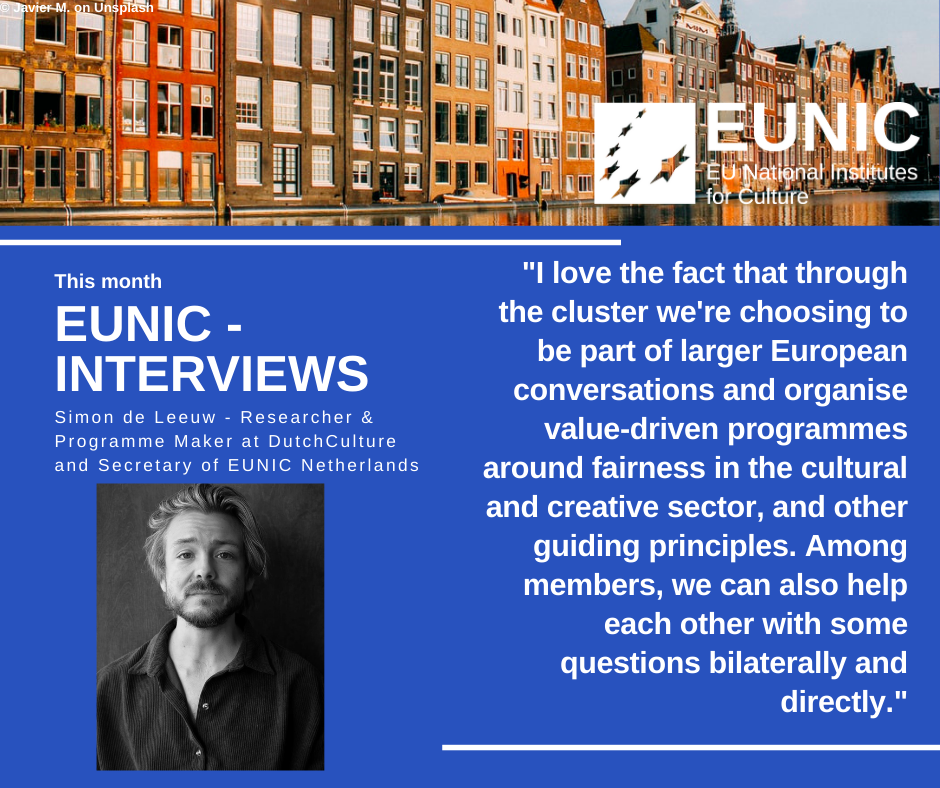
1. What role do you play at your institute/embassy?
I work as a programme maker and researcher at DutchCulture, working on themes that are of long-term significance to our work field – ranging from the future of European democracy to the needs of emerging artists in the Netherlands. My relation to EUNIC is twofold, as I have been a Focal Point, representing DutchCulture at EUNIC Global in Brussels since June 2021, and I just started my role as Secretary in the EUNIC NL Cluster.
2. How do you contribute to EUNIC?
As a secretary in the cluster, I hope to be able to create the conditions to work with members on relevant projects with a sense of shared responsibility. A considerable part of that is ensuring that the internship experience that we offer in the Cluster is a rewarding and inspiring one. Additionally, from DutchCulture’s perspective, I hope to link up the Dutch cultural sector – artists, practitioners and organisations – with the programmes that the cluster initiates where needed and bring relevant themes to the forefront.
3. What is the best aspect about being a EUNIC-Netherlands member?
I love the fact that through the cluster we’re choosing to be part of larger European conversations and organise value-driven programmes around fairness in the cultural and creative sector, and other guiding principles. Among members, we can also help each other with some questions bilaterally and directly. Also not insignificant, If you take into account the connectivity of all our members, the EUNIC-cluster offers access to a larger cultural network, which is an impressive asset too.
Interview with Issy Winkler (EUNIC Intern)
For June’s interview of the month, we spoke to our outgoing intern, Issy, as she wraps up her 6-month internship at EUNIC Netherlands.
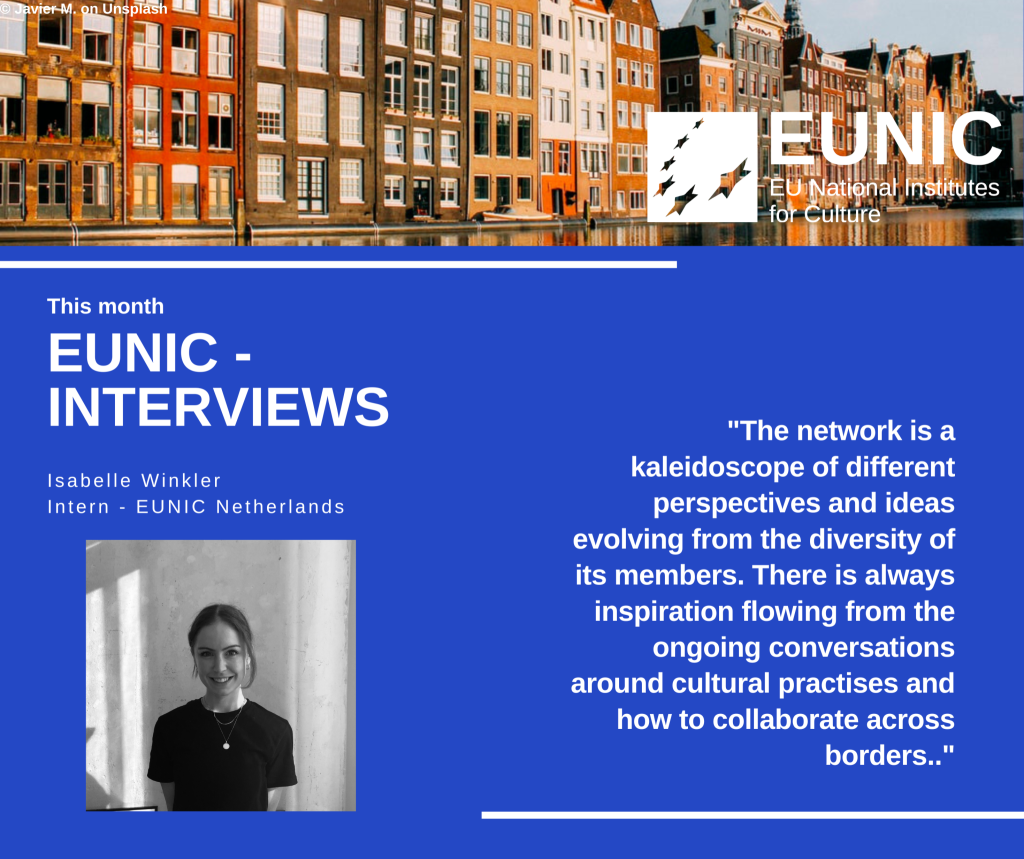
1. What role do you play in your institute/embassy?
I work part-time as an intern for the EUNIC Netherlands cluster whilst completing my Master’s thesis.
2. How do you contribute to EUNIC?
The cluster has a number of different working groups for its various projects, so I was lucky enough to work across a variety of topics. Over the last 6 months, this included helping to create DEI guidelines with the Anti-Racism and Diversity working group, organising an event for Europe Day with the FAIR P(L)AY working group, working on the 2023 European Literature Night, and getting the ball rolling for the upcoming European Day of Languages.
3. What is the best aspect about being a EUNIC Netherlands member?
For me, the network is a kaleidoscope of different perspectives and ideas evolving from the diversity of its members. There is always inspiration flowing from the ongoing conversations around cultural practises and how to collaborate across borders. This European perspective on presenting shared values and goals through cultural events is really heart-warming to witness and humbling to be a part of.
Interview with Anna Devi Markus (British Council)
Anna Devi works in the Cultural Engagement team at the British Council in the Netherlands as Project Manager. Read on to learn more about her role with the EUNIC NL cluster.
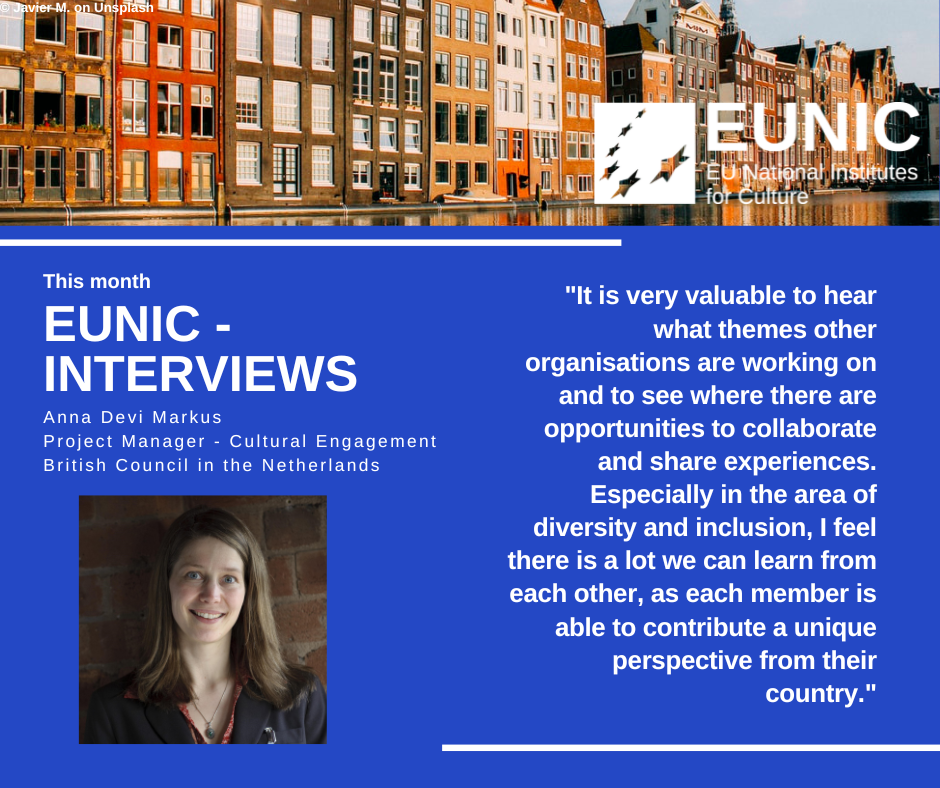
1. What role do you play in your institute/embassy?
I work in the Cultural Engagement team at the British Council in the Netherlands as Project Manager. Together with our Head of Education, I work on a range of programmes that aim to create opportunities for young people and build trust between institutions and people. This includes a series of Knowledge Exchange events, which includes policy dialogues, webinars, and events, from anti-racism to public engagement. I have the lead responsibility for cultural engagement with young people. This includes supporting teachers to build inclusive classrooms and explore global challenges, as well as a new scheme to support future leaders in the higher education and cultural sectors, for those aged 20 to 35 years of age to exchange ideas and develop their skills.
2. How do you contribute to EUNIC?
The British Council has been part of the EUNIC Netherlands cluster for a long time. Over the years, we have taken part in various events, such as the European Literature Night with authors from the UK, the European Day of Languages with a teacher of Welsh, and many more. I am personally most active in the EUNIC Diversity group. As a member of this group, I organised an unconscious bias training for all EUNIC members as well as hosted a session on diversity at our office in Amsterdam. We are currently working on guidelines for EUNIC events that strive to enhance and promote inclusive practices and content within EUNIC programmes.
3. What is the best aspect about being a EUNIC Netherlands member?
For me, the best aspect of being part of EUNIC is the contact with (international) colleagues that represent organisations from all over Europe. It is very valuable to hear what themes other organisations are working on and to see where there are opportunities to collaborate and share experience. Especially in the area of diversity and inclusion, I feel there is a lot we can learn from each other, as each member is able to contribute a unique perspective from their country.
Interview with Viola Karsten (Goethe-Institut)
This month, we had the pleasure of chatting with Viola Karsten from the Goethe-Insitut in Amsterdam. Viola works in cultural programming, generating ideas to stimulate intercultural exchange and building projects across diverse cultural mediums. Read on to learn more about her role at the Goethe-Institut and how her work contributes to the wider EUNIC Netherlands network.
(image courtesy of © Janine Schrijver)
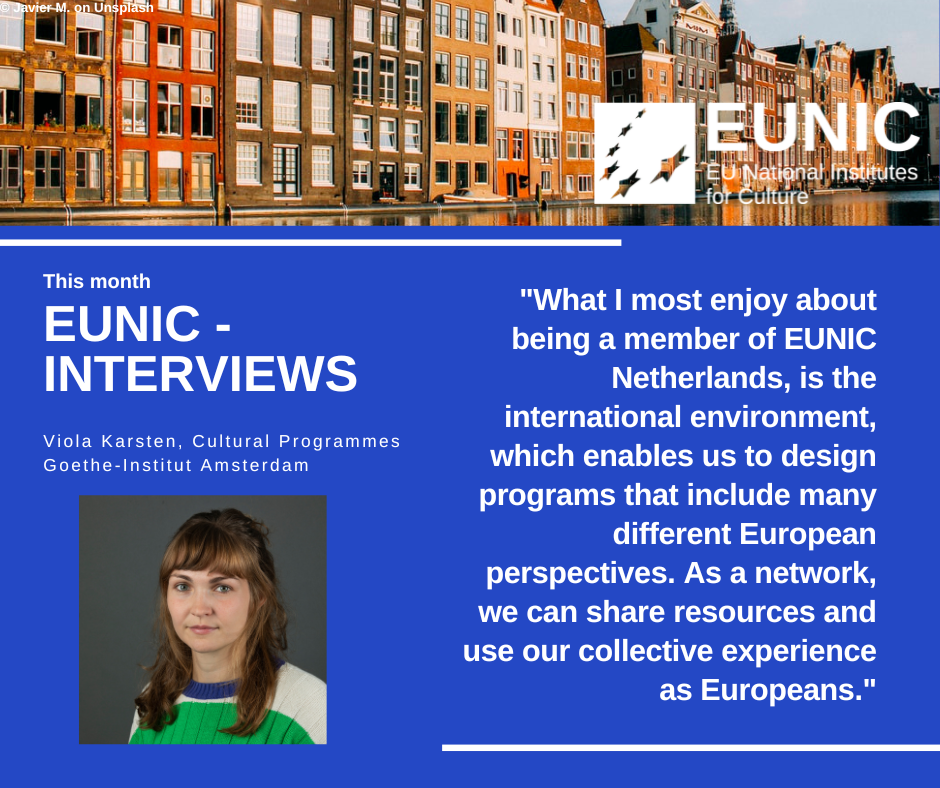
- What role do you play in your institute/embassy?
I work in the cultural program at the Goethe-Institut in Amsterdam, where I plan and coordinate cultural events and other projects that stimulate intercultural exchange. For this, I stay in close contact with local partners in the Netherlands and simultaneously keep an eye on cultural impulses from Germany. My job is very diversified, as I am involved in many different projects from different fields, which range from literature to music, theatre, and cultural – as well as political – discourses.
- How do you contribute to EUNIC?
As one of the EUNIC members, the Goethe-Institut is involved in different working groups. I am currently working on the European Literature Night, which will take place in June, and a program under the topic “Fair P(l)ay” for Europe Day on the 9th of May. Besides that, the Goethe-Institut holds this year’s presidency of EUNIC Netherlands.
- What is the best aspect of being a EUNIC Netherlands member?
What I most enjoy about being a member of EUNIC Netherlands, is the international environment, which enables us to design programs that include many different European perspectives. As a network, we can share resources and use our collective experience as Europeans. Together, we can set accents and carry topics into the world that are important to us. A good example is the great work of the Safer Space Working Group, which uses the combined knowledge and skills to make our programs more accessible, particularly for marginalized groups.
Interview with Alberto Madrona Fernández (Instituto Cervantes)
As we welcome the New Year, we had the pleasure of chatting with Alberto Madrona Fernández, who is the Head of Studies at the Instituto Cervantes in the Netherlands. Read on to learn more about his role at the institution and what he loves most about being part of the EUNIC Netherlands cluster!
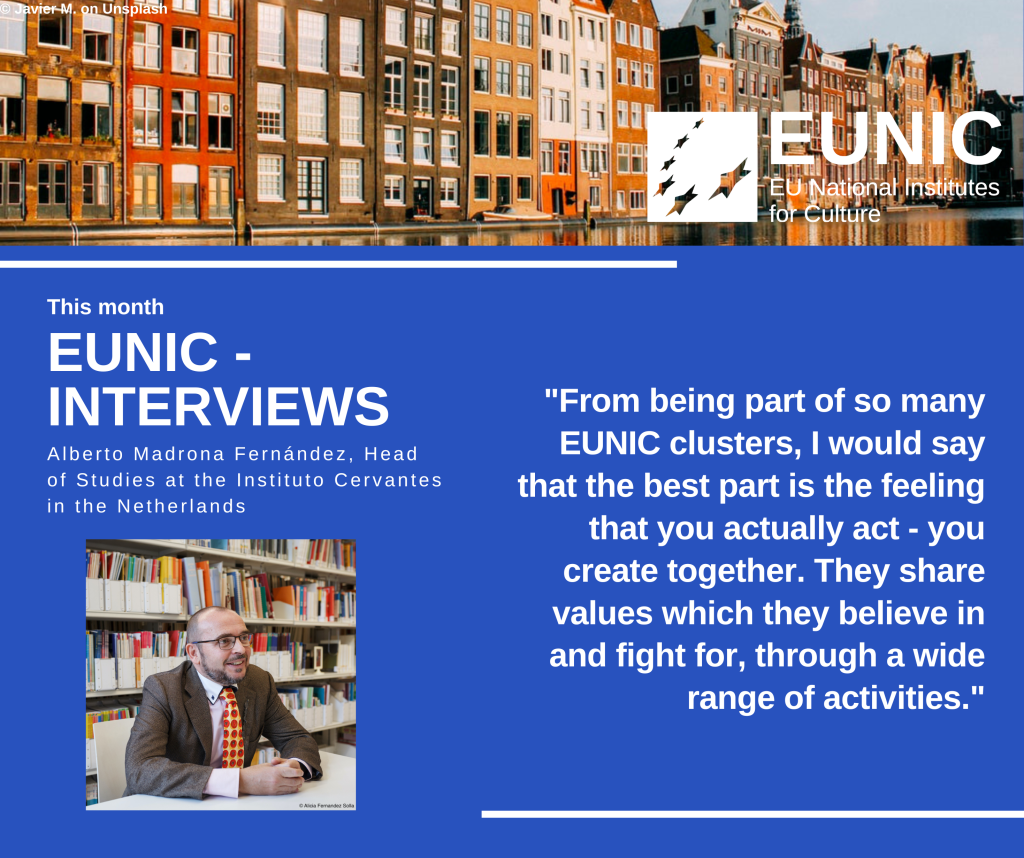
1) What role do you play in your institute/embassy?
I am the Head of Studies at the Instituto Cervantes in the Netherlands, whose headquarters are in Utrecht. My job consists of planning the institute’s activities, basically Spanish language courses for foreigners, courses for the co-official languages in Spain (such as Catalan, Galician and Basque), Spanish courses for children, and things like that. In addition, I am in continuous contact with Dutch educational institutions like universities, hogescholen and teacher associations of Spanish, among others.
My second task is to manage the language certification exams, DELE and SIELE, in the country.
2) How do you contribute to EUNIC?
I have been living outside of Spain for 29 years, in very different countries, and all of my work as an academic coordinator is based on the values promoted in the EUNIC clusters: selecting a varied and inclusive teaching staff, promoting curriculum in which values prevail such as integration, critical analysis, and education for citizenship, as well as promoting respect and dialogue in the classroom. And, of course, actively organizing the celebration of the International Day of Languages: here in the Netherlands, I have already participated twice in the Openbare Bibliotheek Amsterdam speak-dating, which is a fabulous event.
3) What is the best aspect about being a EUNIC Netherlands’ member?
Actually, the representative of the Instituto Cervantes for EUNIC is the director of the centre, not me directly. However throughout all these years, from being part of so many EUNIC clusters, I would say that the best part is the feeling that you actually act – you create together. They share values which they believe in and fight for, through a wide range of activities.
Interview with Isabelle Reuser (EUNIC NL Intern)
Time for our final interview of the year as 2022 draws to a close! This December, meet Isabelle Reuser, who has been our intern for the last six months. Scroll down to find out about how Isabelle contributes to EUNIC Netherlands and what she most appreciates about working for us.
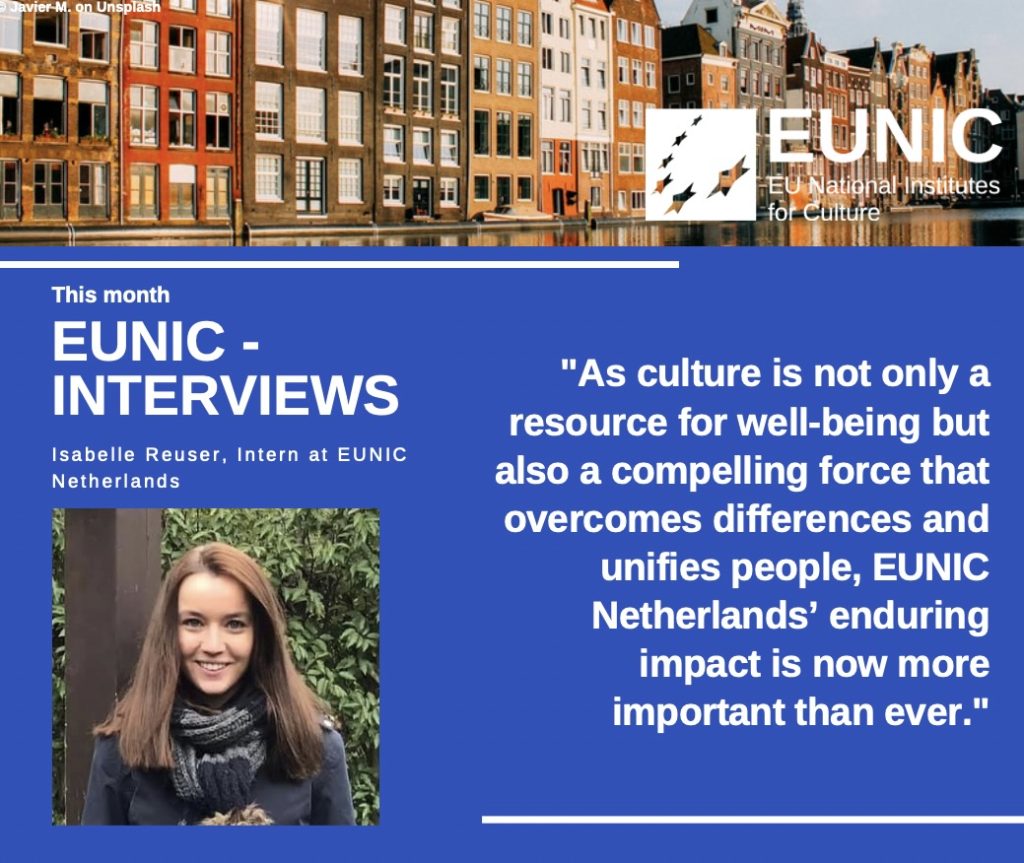
1) What role do you play in your institute/embassy?
I am the current intern at EUNIC Netherlands and communication is at the heart of my internship. EUNIC Netherlands aims to provide a solid platform of engagement for member institutes and effective communication is vital for collaborative teamwork. I liaise with our members and external organisations on a daily basis, so projects can be kept on schedule. In addition, I aim to inform and inspire as many people as possible while raising EUNIC Netherlands’ profile and promoting a range of events through our online channels.
2) How do you contribute to EUNIC?
My responsibilities are extremely varied and I just love the fact that no single day has been the same since I started as an intern in July 2022. My tasks include creating digital content for EUNIC’s website, LinkedIn, Facebook and Instagram, preparing and attending meetings, organising cultural events and writing the monthly newsletter.
As EUNIC Netherlands operates in a fast-paced environment where a lot is happening simultaneously, it is vital to assess and prioritise various tasks. This is particularly important when the organisation of my day-to-day tasks coincides with the organisation of major events, such as the European Day of Languages. I was part of the working group which organised numerous activities in several Dutch cities to mark that occasion. I also implemented a communication strategy for this event and analysed feedback we received.
3) What is the best aspect about being a EUNIC Netherlands member?
My internship has been an amazing experience on so many levels. However, the very best aspect is definitely the amazing people making up EUNIC Netherlands’ network that I have had the pleasure to work with during the last six months. Together, they successfully deliver projects and objectives by making the most of everyone’s skills and by using their collective experience. Their professionalism, commitment and enthusiasm are truly impressive (and contagious!). As culture is not only a resource for well-being but also a compelling force that overcomes differences and unifies people, EUNIC Netherlands’ enduring impact is now more important than ever.
Interview with Hélène Pichon (Alliance Française)
This month, meet Hélène Pichon, the Director of the Alliance Française of The Hague and Coordinator of the network of Alliances Françaises in the Netherlands. Discover all about Hélène’s contributions to EUNIC Netherlands and learn why she values being a EUNIC member below!
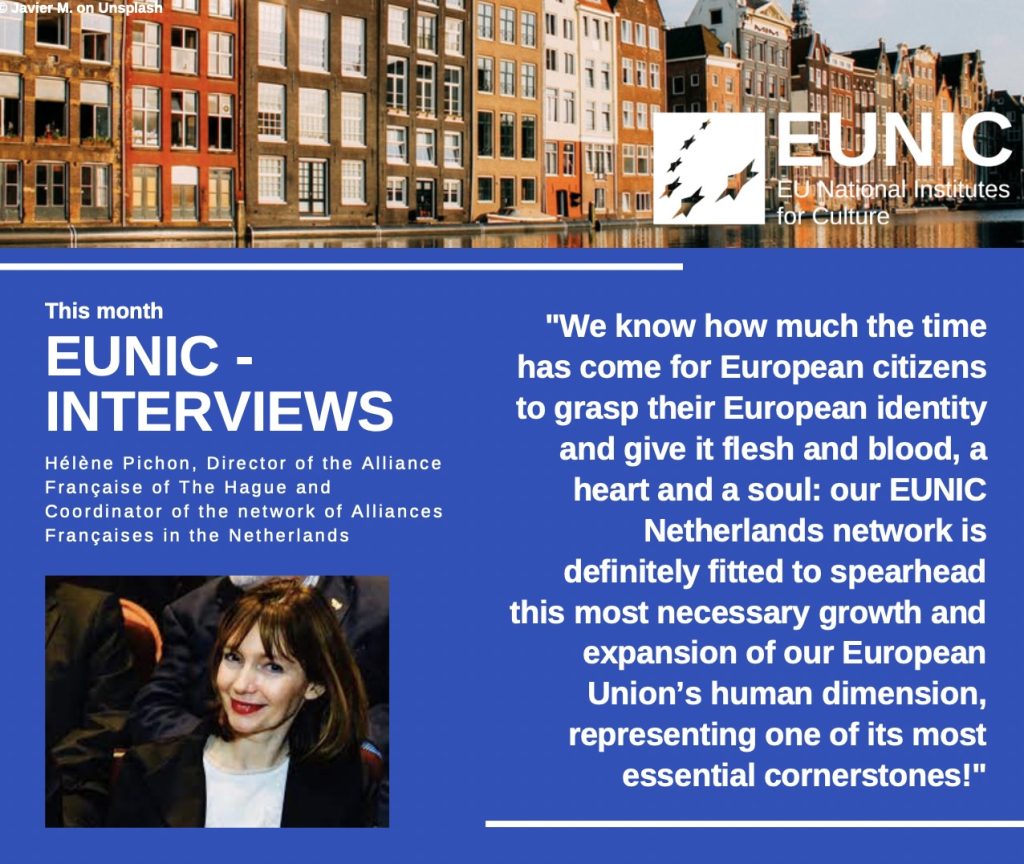
1) What role do you play in your institute/embassy?
I am the Director of the Alliance Française of The Hague and the coordinator of the network of the 33 Alliances Françaises located in the Netherlands. In this capacity I am, with the support of the Institut Français in the Netherlands, the French Embassy in the Netherlands and the boards of all our Alliances Françaises, in charge of promoting the French language and culture throughout the Netherlands and also in 11 international organisations located in The Hague and the rest of the Netherlands.
2) How do you contribute to EUNIC?
I am committed to contributing to the European Union National Institutes for Culture – EUNIC – network in the Netherlands by organising projects, events and collaborations that demonstrate how our multiple languages and cultures contribute to cement our unity as European citizens through the diversity of our languages and cultures. For instance, it was a great privilege to host the European Day of Languages in September in our Alliances Françaises in The Hague and Rotterdam for large numbers of students in the Netherlands who were thus given an opportunity to discover not only the French language but also several languages such as Georgian, Romanian, Ukrainian, Irish and Czech, amongst others! Such richness echoes the beautiful quotation of Antoine de Saint-Exupéry that has always been the compass of my life: “Far from threatening me, my brother, your difference enriches me !”
3) What is the best aspect about being a EUNIC Netherlands member?
The best aspect about being a EUNIC Netherlands member is definitely to be immersed here, on the ground in the Netherlands, into the reality of a true European citizenship. So many of our nations are represented here in the population: a lot of expats are studying and working in the Netherlands, thanks to the economic dynamism of the Netherlands. But not only are the Netherlands emblematic of a truly dynamic country, but the Netherlands are also very welcoming to the many nations of the world and are most open to the richness and diversity of foreign cultures including European ones. This most cosmopolitan atmosphere creates a very fertile ground for the EUNIC Netherlands network to thrive, allowing for projects to become concrete immediately, benefitting a wide audience and public! This is truly amazing! I just arrived in The Hague in September but I can already feel that the Netherlands can play the role of a true incubator of European linguistic and cultural identity. I feel blessed to have been given a chance to lay a few stones in this building of the European Human construction! We know how much the time has come for European citizens to grasp their European identity and give it flesh and blood, a heart and a soul: our EUNIC Netherlands network is definitely fitted to spearhead this most necessary growth and expansion of our European Union’s human dimension, representing one of its most essential cornerstones!
Interview with Martin Bach (Goethe-Institut)
The EUNIC Netherlands interview of the month is back after a short summer break. This month, we are delighted to introduce you to Martin Bach, who became the president of the EUNIC Netherlands cluster last month. Find out more about Martin and his role at EUNIC Netherlands below.
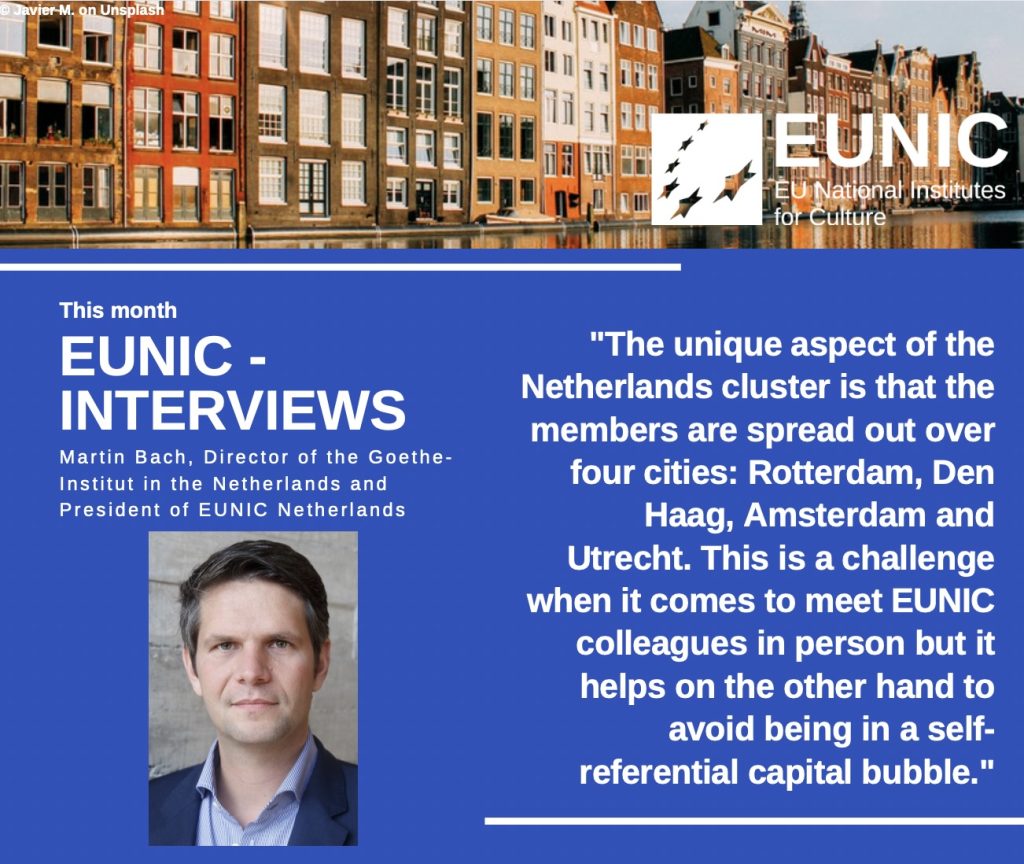
1) What role do you play in your institute/embassy?
As director of the Goethe-Institut Netherlands I am responsible for the local activities in cooperation with the whole team. We have two offices in the Netherlands; one in Rotterdam and one in Amsterdam. Both houses have a small event space and classrooms. In Rotterdam we are co-located with the Czech Centre.
2) How do you contribute to EUNIC?
The Goethe-Institut has around 160 offices in almost 100 countries. We aim at being an active member in all EUNIC clusters. For the time being, the Secretary-general of the Goethe-Institut is president of EUNIC Global.
3) What is the best aspect about being a EUNIC Netherlands member?
The unique aspect of the Netherlands cluster is that the members are spread out over four cities: Rotterdam, Den Haag, Amsterdam and Utrecht. This is a challenge when it comes to meet EUNIC colleagues in person but it helps on the other hand to avoid being in a self-referential capital bubble. I am convinced that all members benefit from the network.
Interview with Eve Reincke (Estonian Embassy)
This month, meet Eve Reincke, Adviser at the Estonian Embassy in The Hague and valued member of EUNIC Netherlands. This year, the Estonian Embassy will participate in not one but two of our flagship events: the European Literature Night and the European Day of Languages. Find out more about what Eve does at the embassy and why she values being a member of EUNIC below.

1) What role do you play in your institute/embassy?
I cover four different but complementary sectors: politics, media, business diplomacy and – last but not least – culture. I love this combination because it enables me to connect different experiences and come up with interesting combinations – for example involving successful Estonian companies to support young Estonian artists and getting the media enthusiastic about it, as well. Cultural diplomacy is really rewarding because it can work wonders in difficult times and offer people consolation and hope.
2) How do you contribute to EUNIC?
We participate in different inspiring projects with cultural highlights from Estonia. For example, the European Literature Night is a great platform for European writers to share their stories and we are very proud that this year Rein Raud represented Estonia. Personally, besides being a book worm, I am also a movie-freak and that is why I enjoyed participating in the EUNIC Filmdagen movie weekend last year, where movies from nearly 10 European countries could be watched online. And, of course, our embassy values the attention that can be devoted to different European languages via EUNIC. Estonian is a language spoken as a mother tongue by only 1.1 million people around the world but we gladly introduce our beautiful (but beware, somewhat difficult 😊) language to wider audiences – that is why we also participate in the European Day of Languages.
3) What is the best aspect about being a EUNIC Netherlands’ member?
Bringing all the inspiring cultures together, brainstorming on ideas that turn out to be vivid projects and the notion that together we can make things happen that do make a difference. And surely seeing all these happy faces every month during our meetings, whether online or in person!
Interview with Bart Govaert (Brakke Grond)
This month, we would love you to meet Bart Govaert, the director of Vlaams Cultuurhuis de Brakke Grond. De Brakke Grond is the place for Flemish artists and Dutch art lovers who want to push their boundaries to come together. Find out more about Bart’s activities in his interview below.
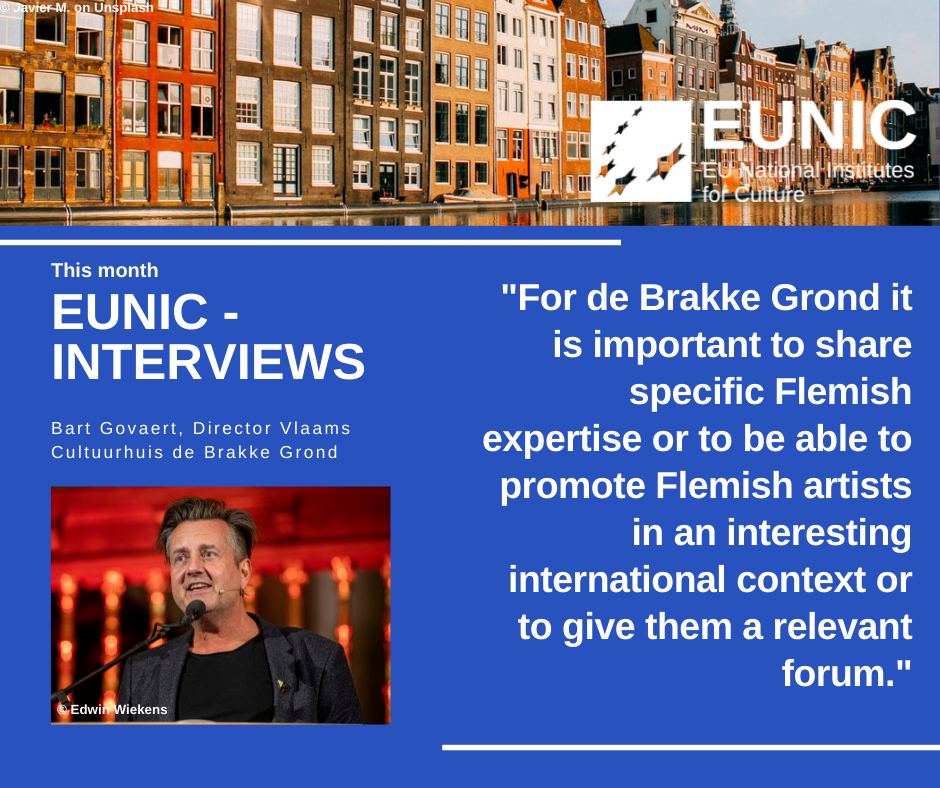
1) What role do you play in your institute/embassy?
I am the director of “het Vlaams Cultuurhuis de Brakke Grond” in Amsterdam. We promote and facilitate Flemish artists in the Netherlands and try to initiate and guide cooperations between Dutch and Flemish cultural organizations. I am glad to be able to do that with a really great team of 15 enthusiastic colleagues and from a wonderful venue with endless possibilities in the centre of Amsterdam.
2) How do you contribute to EUNIC?
When a EUNIC Netherlands project ticks some of our boxes, we are certainly willing to participate. The European Literature Night for instance is one of these events, and, more recently, the FAIR P(L)AY initiative was also a project in which we were glad to join. For de Brakke Grond it is also important to share specific Flemish expertise or to be able to promote Flemish artists in an interesting international context or to give them a relevant forum.
3) What is the best aspect about being a EUNIC Netherlands’ member?
I think that is to share knowledge and know-how, specifically in an international cultural environment. By joining EUNIC you stay in touch with lots of valuable colleagues. It is nice to exchange experiences or best practices, to build up your network and to get to know nice and interesting people.
Interview with Esther Eumann (EUNIC NL Intern)
This month, we introduce to you our intern, Esther Eumann. As the only person working solely for EUNIC Netherlands, our interns play an important part in coordinating the different cluster members. Esther started her internship in January this year for a six-month period. Find out more about what it means to be an intern at EUNIC Netherlands below.
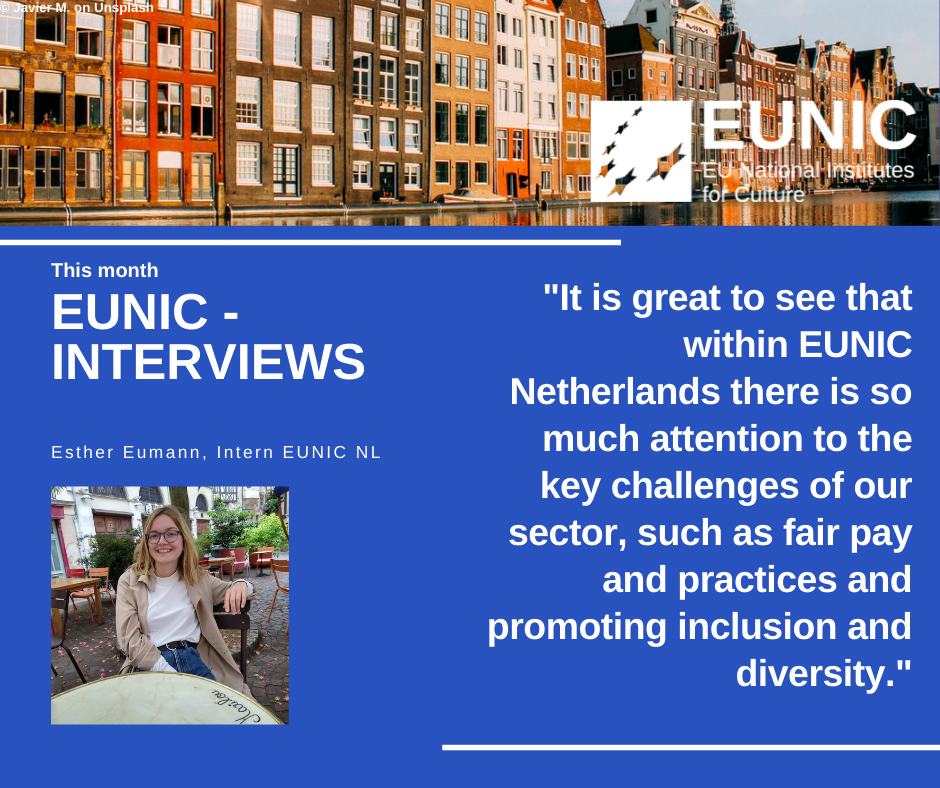
- What role do you play in your institute/embassy?
I am the intern of EUNIC Netherlands. My everyday tasks are organizing the cluster meetings, and keeping our website and social media up to date. I am also responsible for our newsletter and serve as the first point of contact between the cluster members. I really enjoy my diverse working tasks: from drafting a speech for our president one day to designing a social media campaign the next. As EUNIC Netherlands has no office of their own, I have the benefit of hopping between the different institutes.
2. How do you contribute to EUNIC?
Next to my everyday tasks, I am also involved in several different working groups, where I help with the organization and promotion of our events. For example, I helped organize the launch of our FAIR P(L)AY cycle this month, which has been a great success. I also was part of the team putting together our programme at Go Short, the international short film festival in Nijmegen, where we organized a film screening and panel discussion about working across borders. Apart from that I am also involved in the organization of our flagship event the European Literature Night and part of the Anti-Racism and Diversity Working Group. I am very happy that our newsletter now includes a section where we share recommendations from that working groupIt is great to see that within EUNIC Netherlands there is so much attention to the key challenges of our sector and beyond, such as fair pay and fair practices and promoting inclusion and diversity, but also the Russia-Ukraine war, which will be the topic of the European Literature Night.
3. What is the best aspect about being a EUNIC Netherlands’ member?
I am really loving working together with so many different people from different backgrounds. In the last months, I have met many very inspiring colleagues who are working hard to make a difference in the cultural sector and bring a European perspective to the table and I think that really shows in the events we have planned the upcoming months. And it is always wonderful, when you see an event, that you have been working towards for quite some months, come together and be a success.
Interview with Hana Schenková (Czech Centre)
This month, we would like to introduce to you the fourth and last member of our board: Hana Schenková. Hana is the treasurer of EUNIC NL, as well as the Director of the Czech Centre in Rotterdam 🇨🇿. Having previously been the Director of EUNIC NL, we are very happy to have welcomed Hana back in the board last year. Find out more about Hana’s position and all the EUNIC events she is involved in below.
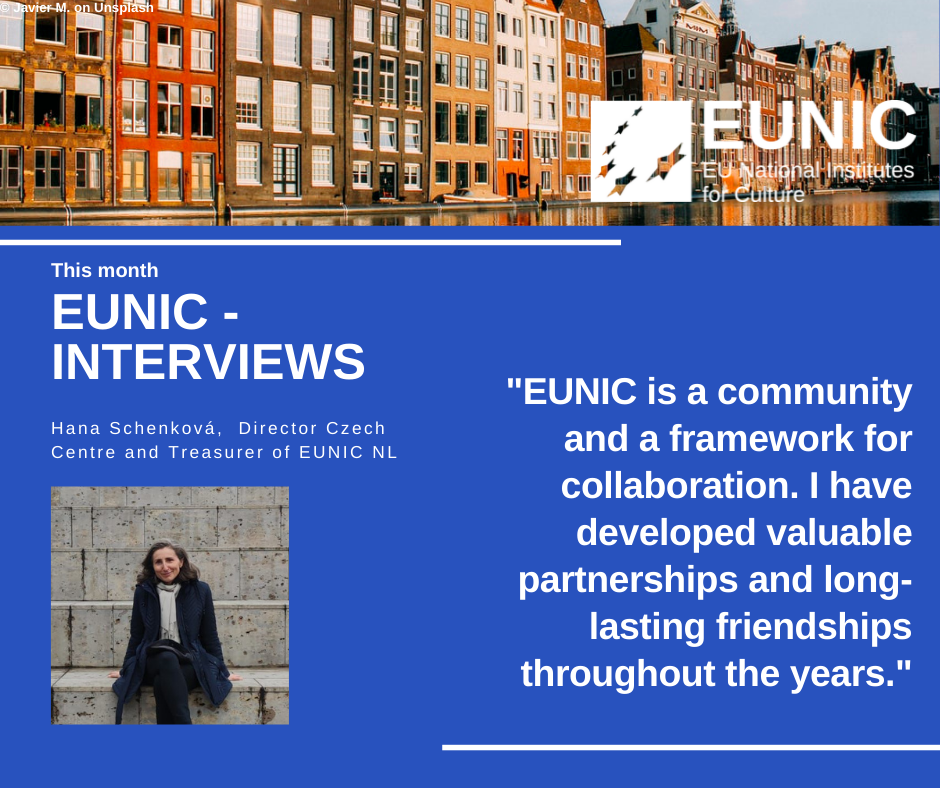
1) What role do you play in your institute/embassy?
I am the Director of the Czech Centre in Rotterdam. At the moment, the network of Czech Centres worldwide consists of 26 institutes across three continents. Our purpose, amongst others, is to promote Czech culture and art, the creative industries and science in the Netherlands. We (co-)organise various events and bring together Czech and Dutch artists and institutions. With our Dutch counterparts we are brainstorming and searching for original topics which are relevant and interesting to the Dutch audience. We also support study trips of Dutch art professionals to selected festivals in Czechia. The Czech Centre has no space of its own, we rent two offices at the Goethe-Institut in Rotterdam which gives us the opportunity to use their space and work together.
2) How do you contribute to EUNIC?
The Czech Centre has been a cluster member for a long time and it has always been an active one. I myself joined the group in 2009. In 2015, I became EUNIC NL president for more than two and a half years. After leaving the board, I came back as its treasurer last year. In the past I was actively involved in the European Day of Languages. I coordinated several editions in Rotterdam for the local secondary schools: mavo, havo and vwo. At present, I am one of the coordinators of another big EUNIC project – the European Literature Night – which brings European writers together to discuss current issues. After two online editions during the COVID-19 pandemic we are looking forward to a physical event this year. Furthermore, I am also a member of the working group focusing on fair practices in the cultural sector.
3) What is the best aspect about being a EUNIC Netherlands’ member?
EUNIC is a community and a framework for collaboration. I have developed valuable partnerships and long-lasting friendships throughout the years. I enjoy working together on joint projects with a diverse group of colleagues with different languages, cultures, approaches and attitudes. We get the opportunity to network and make things happen. If we want to create something positive, we have to cooperate with each other. And this applies to everything.
Thank you, Hana, for your interview and we are looking forward to the European Literature Night and all other EUNIC projects you are involved in!
Interview with Emma Hartkamp (European Commission Representation)
This month, we would like you to introduce you to a very special member of our cluster: Emma Charlotte Hartkamp, who works for the Representation of the European Commission in the Netherlands 🇪🇺. You may have heard about her already if you were following the series on multilingualism EUNIC organised last year or joined for the European Day of Languages. But why is the European Commission a member of EUNIC Netherlands? And what projects will Emma be involved in this year?
Read her interview below.
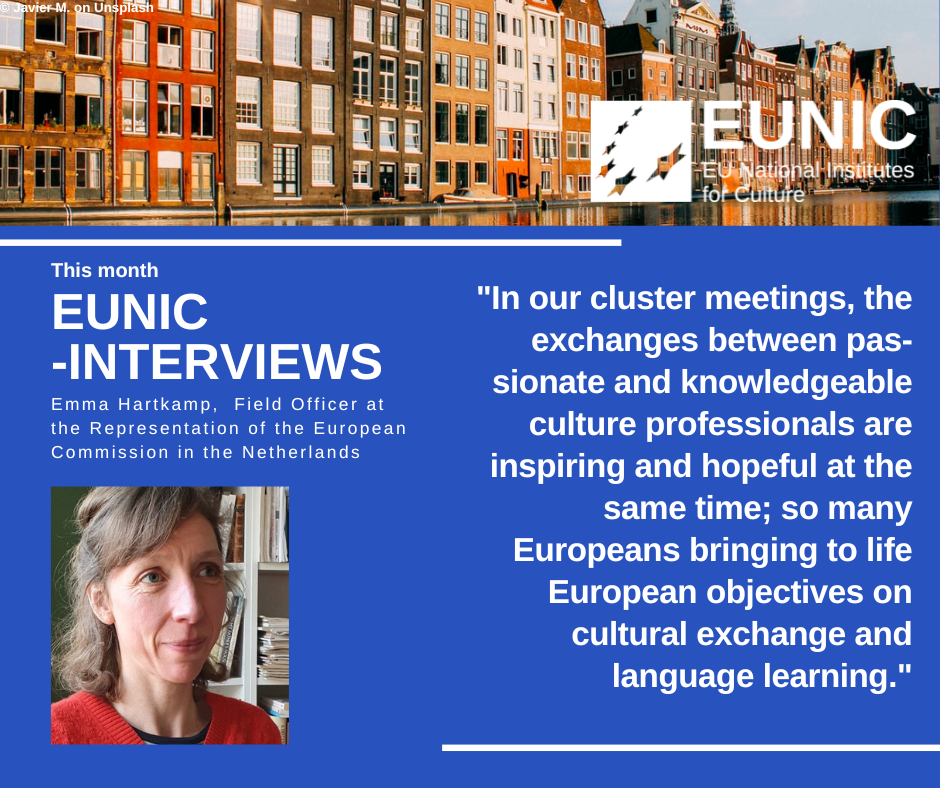
1) What role do you play in your institute/embassy?
The official title of my function at the Representation of the European Commission in the Netherlands is ‘field officer’, an ‘obscure’ name for a job in which clear writing for the public takes an important place 😊. On the one hand, I translate, edit and localise Commission texts for the Dutch public, e.g. press releases, opinion articles, web texts and social media slogans. On the other, I organise events in the Netherlands in the field of translation, languages and multilingualism. Indeed, although the EU countries design their own policies in the field of education and culture, the Commission promotes multilingualism and language learning as a corner stone and founding principle of the European Union.
It is a very interesting role, as I always need to keep in mind both ‘worlds’: the objectives and ambitions of the Commission and the Dutch language sector, with its specificities, challenges and particular needs. The objective is to draw the best of two worlds and to let them benefit from each other.
2) How do you contribute to EUNIC?
The European Commission has a particular status within EUNIC NL, as an ‘observer’ and important partner in many projects. Attending the cluster meetings allows the Commission to take stock of important developments and initiatives in the Dutch cultural sector, springing from successful cooperation projects between national institutes of culture and embassies in the Netherlands. EUNIC and the Commission share important objectives, such as intercultural exchanges and multilingualism in Europe, which allows us to cooperate in a great number of projects. For quite a few years already, we have organized together two playful and valuable events for the yearly European Day of Languages, on 26 September: fun language classes in a wide variety of European languages for lower high school pupils and speak-dates for the general public to get a taste of an unknown language or bring back memories in another language. This year, the OBA (public library of Amsterdam) will organize a whole series of speak-dates around our European edition thanks to the success of the last edition!
Last year, we also launched a new cooperation project, which attracted wide and new audiences in the field of translation and languages. In this series of lectures/talks and panel discussions, we organised a lecture with tips and tricks on multilingual education, a passionate and inspiring talk on language learning through films and subtitling (combine business with pleasure!), a discussion on multilingualism in big cities and a panel discussion on multilingual diversity in Europe in theory and practice. This year, the next appointment in this series might address the wide and ever-growing range of language professions.
3) What is the best aspect about being a EUNIC Netherlands’ member?
It is a great pleasure to see the European Union live and thrive ‘in the field’. This is perhaps where the function title ‘field officer’ makes sense after all 😊. In our cluster meetings, the exchanges between passionate and knowledgeable culture professionals are inspiring and hopeful at the same time; so many Europeans bringing to life European objectives on cultural exchange and language learning. I have the privilege to shape common projects with the fantastic members of the Dutch EUNIC cluster and participate in many others, in the interest of Europe and the Netherlands, and to my personal pleasure.
Thank you, Emma Hartkamp, for this lovely interview – we cannot wait for more great events on language and multilingualism!
Interview with Gala-Alexa Amagat (Institut Français)
On the occasion of the French Presidency of the Council of the European Union, we interviewed Gala-Alexa Amagat, the cultural attaché ad interim of the Institut français des Pays-Bas, about her role in the institute and the plans of the institute for the coming six months. We also talked about what she values about being a member of EUNIC Netherlands and what topics in the cultural sector are especially important to her. 🇫🇷🇪🇺
Curious to find out more? Read her interview below.

1) What role do you play in your institute/embassy?
As of October 2021, I am the cultural attachée ad interim at the Institut français des Pays-Bas. Before holding this position, I worked as transversal project manager at the institute for three years. The Institut français des Pays-Bas is the French agency for cultural cooperation in the Netherlands: it supports French-Dutch mobility and partnerships in the fields of creation, research, education and ideas, and it assists cultural, research and educational professionals in their development in France and the Netherlands. We also curate public programs in partnership with Dutch cultural and academic institutions to foster dialogue between our European societies on contemporary issues, and to stimulate European cooperation. Our institute also promotes the learning of the French language and encourages multilingualism in the Netherlands. At the Institut français des Pays-Bas, we are convinced of the added value of interdisciplinary programs, for example linking art and science, but also tailoring cultural programs to younger audiences and therefore strive to build projects engaging, where possible, the three departments of our institute: cultural, academic and educational.
2) How do you contribute to EUNIC?
The Institut français des Pays-Bas has been actively participating in several programs led by the EUNIC-NL cluster over the past years, with the aim to foster European collaboration in the field of cultural diplomacy. This year the Institut français des Pays-Bas will contribute to the coordination of the European Literature Night and participate in the organization of several workshops around the topic of fair practices in the cultural sector, related to the Fair Practice Code. This is an essential topic for us, especially in the context of the French Presidency of European Union, during which France will initiate a reflection upon the European directive on copyright.
3) What is the best aspect about being a EUNIC Netherlands’ member?
Culture is at the heart of our identity as Europeans. The development of intercultural exchanges in Europe through the mobility of artists and cultural professionals is key. Consequently, being part of the network of EUNIC Netherlands is a great opportunity to further strengthen cultural exchanges and collaborations with other European cultural institutes by sharing our experiences, best practices and by building long-lasting projects together.
Thank you, Gala-Alexa Amagat, for taking the time for this interview and we are looking forward to many exciting projects and events together.
Interview with Sophia Karimi (Goethe-Institut)
In November we introduced you the new President of EUNIC Netherlands, Nina Hauer, and it’s time now to complete the round of presentations announcing the latest acquisition of the new Board of our Cluster: Sophia Karimi 🇩🇪🇳🇱🇪🇺
Sophia is a Program Manager at the Goethe-Institut in Amsterdam, and has recently been elected Vice-President of our Team. Passionate about European culture and literature since her years in Academia, Sophia took part to countless projects of EUNIC, always striving to ensure the smoothest and most successful cooperation among artists and cultural institutes in the country.
Are you curious to know how Sophia experienced the co-organization of EUNIC NL initiatives in the last years? Read EUNIC’s monthly interview, and get to know the freshest new entry of our Board!
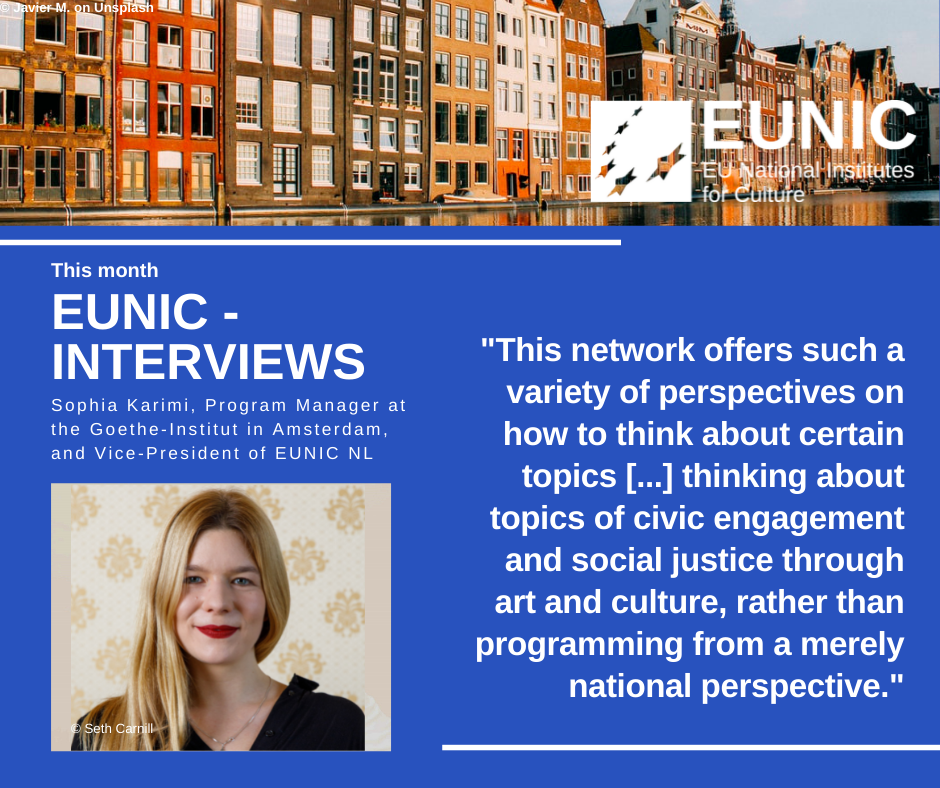
1) What role do you play in your institute/embassy?
I am a program manager at the Goethe-Institut in Amsterdam, which means that I manage and realize a broad variety of very different and diverse cultural projects. My work has two sides: the visible side of curating, producing, and communicating cultural events, and the invisible side of connecting people, institutions, and communities in local and global cultural contexts. Our cultural projects are always realized in a collaborative context, thus establishing and maintaining these connections is a very important task I take care of. It truly gives me such joy to introduce, for example, an artist to another institution, and then both are enabled to realize something new together! By making use of our cultural infrastructures we can play our part in facilitating meaningful things to happen. During the latest months of this ongoing pandemic, I have also realized even more how much we need community and care in our cultural scenes, so I always ask myself when starting a new project: What does everyone involved need in order to feel comfortable and share their best side and work?
2) How do you contribute to EUNIC?
Over the years I have been actively involved in several EUNIC projects, for example the European Literature Night and, recently, EuropeReadr. I am also taking part in internal processes of transformation; for instance, in our EUNIC NL workgroup of diversity and antiracism we were able to organize, among the others, an anti-racism training. We aim for intersectionality, care, and diversity to play an always bigger role in all our EUNIC projects. A topic we will focus on in the near future is fair payment for artists, accessibility, and caring infrastructures. Since this December, I also took on the role of Vice-President of the EUNIC NL cluster, therefore I am now part of the board, joining an amazing all women’s team!
3) What is the best aspect about being a EUNIC Netherlands’ member?
The community and people, for sure! Our meetings are a lot of fun. This network offers such a variety of perspectives on how to think about certain topics. A lot of national cultural institutions went through a paradigm shift in recent years – such as the Goethe-Institut – thinking about topics of civic engagement and social justice through art and culture, rather than programming from a merely national perspective. In this way, it is really valuable to have a meaningful ongoing exchange between us, and realize projects together in a collaborative process.
Thank you, Sophia Karimi, for letting us looking at European cultural collaboration through your eyes. We wish you all the best in your new role as Vice-President of EUNIC Netherlands. Looking forward to the projects of 2022!
Interview with Nina Hauer (Embassy of Hungary)
What better than a great news can warm up a cold, rainy day of November? EUNIC Netherlands has the pleasure to announce that our Dutch Cluster has a new, enthusiastic Board! In the last weeks our international team voted to elect the colleagues that will represent the Cluster during the upcoming events, taking over the splendid job done up until now by the current Board. The members were more than happy to vote Nina Hauer as new President, and we cannot wait longer to introduce her to you 🇭🇺🇳🇱🇪🇺
Nina is the Cultural Manager of the Embassy of Hungary in the Hague and, since the very beginning of her career at the Hungarian Embassy, she has been one of the most active members in EUNIC Netherlands. Stepping in as Vice-President side by side with Daria Bouwman, she contributed enormously to several projects, including two of the most successful ones of 2021: the European Day of Languages, and EuropeReadr.
Read her interview below and get to know better the new Ms President.
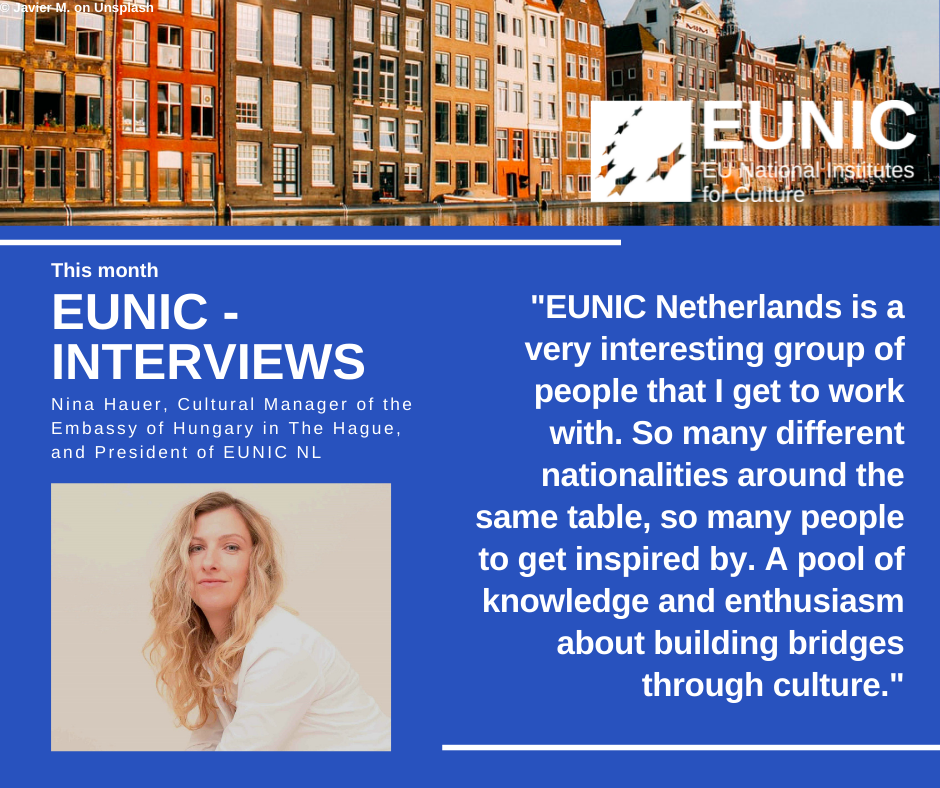
1) What role do you play in your institute/embassy?
As Cultural Manager of the Embassy of Hungary in The Hague I am involved with the promotion of Hungarian art and culture here in the Netherlands. We see where we can offer which support to both starting and more well-known talent. We work closely with the players in the Dutch cultural field to further promote Hungarian artists and give them the platform they deserve. Hungary has a rich cultural history with big names, but there are also many interesting developments in the current Hungarian cultural field worth sharing.
2) How do you contribute to EUNIC?
I became active at EUNIC Netherlands immediately after starting at the Hungarian Embassy in April 2019. After co-organizing the yearly European Day of Languages event, which aims to draw attention to the numerous languages spoken in Europe and strives to emphasize the value and advantage of learning new languages, I joined the EUNIC NL board as Vice President for two years and took over as President this month. I try to contribute by always looking for new opportunities to work on EUNIC NL’s mission to promote cultural diversity and understanding between European societies, by finding new partnerships and events that share that mission. This year I was, amongst others, involved with Europe Readr, an initiative of the Slovenian Presidency of the EU Council, which brings current social issues to readers around the world through a free selection of literary works from across the European Union. We managed to realize a reading pavilion designed and created by students from TU Delft, which travelled through the Netherlands, promoting the value of reading and dialogue. Connecting opportunities and people is really what I enjoy the most.
3) What is the best aspect about being a EUNIC Netherlands’ member?
Since EUNIC Netherlands is the framework through which European national cultural institutes and other cultural representatives of European countries in the Netherlands co-operate, it is a very interesting group of people that I get to work with. So many different nationalities around the same table, so many people to get inspired by. A pool of knowledge and enthusiasm about building bridges through culture. I look forward to seeing what we can achieve altogether next year with some returning events, but definitely also some new initiatives. Make sure to sign up to our monthly newsletter to stay informed about our plans!
Thank you, Nina Hauer, for showing all your enthusiasm for the projects you worked for with EUNIC Netherlands’ team, and good luck with your new role as President of our beautiful Cluster! We are all confident you will do, as always, an amazing job.
Interview with Malin Bergström (Finnish Cultural Institute)
It might surprise you, but not every member of EUNIC Netherlands is based in a Dutch city. Indeed, the Finnish Cultural Institute is one of the national institutes for culture that is part of our Cluster although has its office in Brussels. Our Finnish colleagues cover the whole Benelux, working to cultural initiatives not in one, but in three countries! Despite having their office in another State, they are very active also in the Dutch territory, and collaborate with the other local institutes and Embassies to several cultural projects 🇫🇮🇳🇱🇪🇺
For the October edition of EUNIC Netherlands’ series of Interviews, we asked to Malin Bergström to tell us what it means to represent Finland, its culture, and language, in Europe and beyond. In particular, what has been so far her experience as member of our Dutch Cluster. Malin is the Head of Programme at the Finnish Cultural Institute for the Benelux, for which she has been contributing to numerous initiatives such as the series of online seminars ‘In Conversation with the Finnish Institutes’, which saw the first appointment taking place precisely in October 2021.
Keep reading to know more about Malin’s involvement in EUNIC Netherlands.
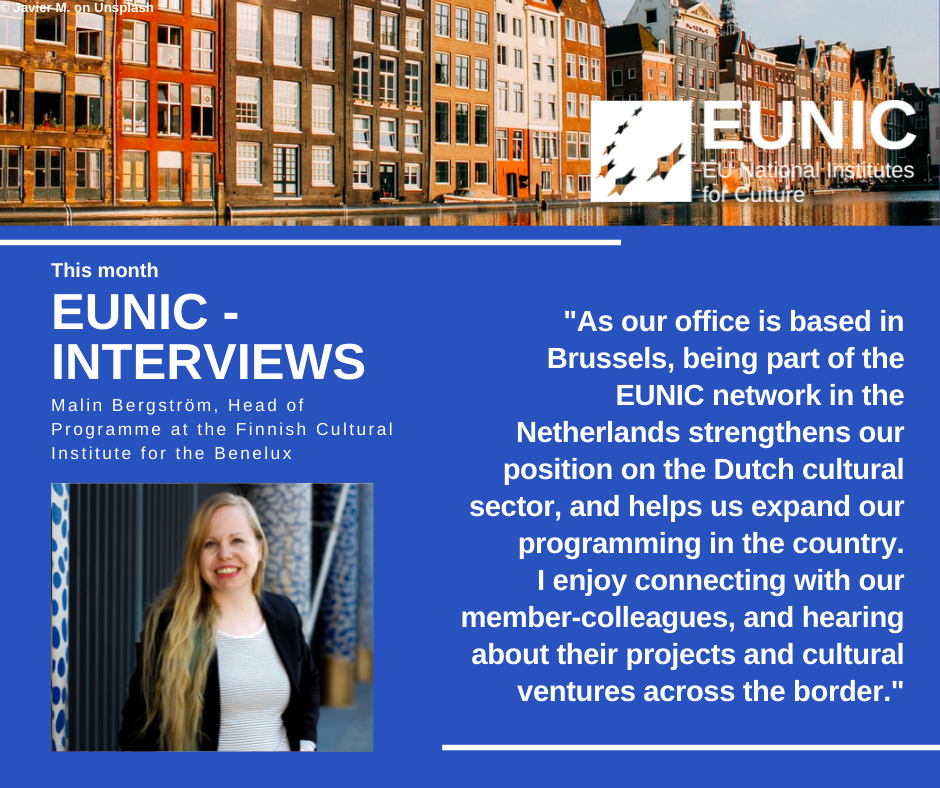
(Photo by Inka Hyvönen)
1) What role do you play in your institute/embassy?
I am the Head of Programme at the Finnish Cultural Institute for the Benelux. Our institute is based in Brussels, Belgium, and is one of 17 Finnish Cultural and Academic institutes around the world. We operate in Belgium, the Netherlands, Luxembourg, as well as Finland, as an independent and non-profit organisation. As a cultural institute we aim to strengthen artistic collaborations between our designated countries of operation, and to create opportunities in which artists and organisations can elaborate new projects and new possibilities of collaboration. The institute also produces its own content and productions in close collaboration with its partner networks, often tackling current social issues within its programming.
My role at the institute as the Head of Programme is to oversee and develop the institute’s programme. Now three years into my work, I have the pleasure to work with successful projects focusing on Finnish crafts, design, and literature, as well our music and performance centred programmes. In addition, I have had the fantastic opportunity to develop our multifaceted and cross-disciplinary Masculinities programme and other projects concerning various societal topics – such as our latest “In Conversation with the Finnish Institutes” online seminar-series.
2) How do you contribute to EUNIC?
As our institute covers both Belgium and the Netherlands, we are members of the EUNIC clusters in both countries. The Finnish Cultural Institute for the Benelux is also the president for the EUNIC Brussels cluster for the 2021-2022 term. Our contribution to the Netherlands cluster is albeit smaller than to Brussels, but we part take in smaller projects and hope to stimulate more diversity and intersectionality in the cluster’s future programming through the cluster’s diversity working group.
3) What is the best aspect about being a EUNIC Netherlands’ member?
For us, the opportunity to network and build bridges with other international actors in the Netherlands is incredibly valuable. The network not only offers the opportunity to partake in their programmes and to collaborate with its members, but also offers advice and support for our operations in the area. As our office is based in Brussels, being part of the EUNIC network in the Netherlands strengthens our position on the Dutch cultural sector, and helps us expand our programming in the Netherlands. And I enjoy connecting with our member-colleagues, and hearing about their projects and cultural ventures across the border.
Thank you, Malin Bergström, for sharing your perspective showing how EUNIC Netherlands’ members successfully collaborate together despite working in different countries.
Follow the Finnish Cultural Institute for the Benelux both on their website and on the Facebook page to read all about their projects and to find out the upcoming dates of the series of online seminars ‘In Conversation with the Finnish Institutes’.
Interview with Éva Jároli-Kóti (Embassy of Hungary)
Those who work in the cultural field like us know how busy and full of events this month is. During the first weeks of autumn, indeed, the whole country farewells the warm season and gets back to business with hundreds of initiatives over the entire national territory. EUNIC Netherlands’ Cultural Institutes and Embassies organised plenty of events to bring European beauties and values closer to the local communities. And Éva
Jároli-Kóti – our interviewee of the month – represents a splendid example of the Embassy of Hungary‘s engagement in EUNIC’s September activities 🇭🇺🇳🇱🇪🇺
Éva is a very active member of our cluster, who was multiple times involved in the organisation of some of EUNIC’s most remarkable events. In particular, she greatly contributed to the success of the European Day of Languages 2021, which brought several classes of secondary school pupils from Dutch schools to experience European linguistic variety through fun lectures in OBA Amsterdam.
Keep reading to know more about Éva’s involvement in EUNIC Netherlands.
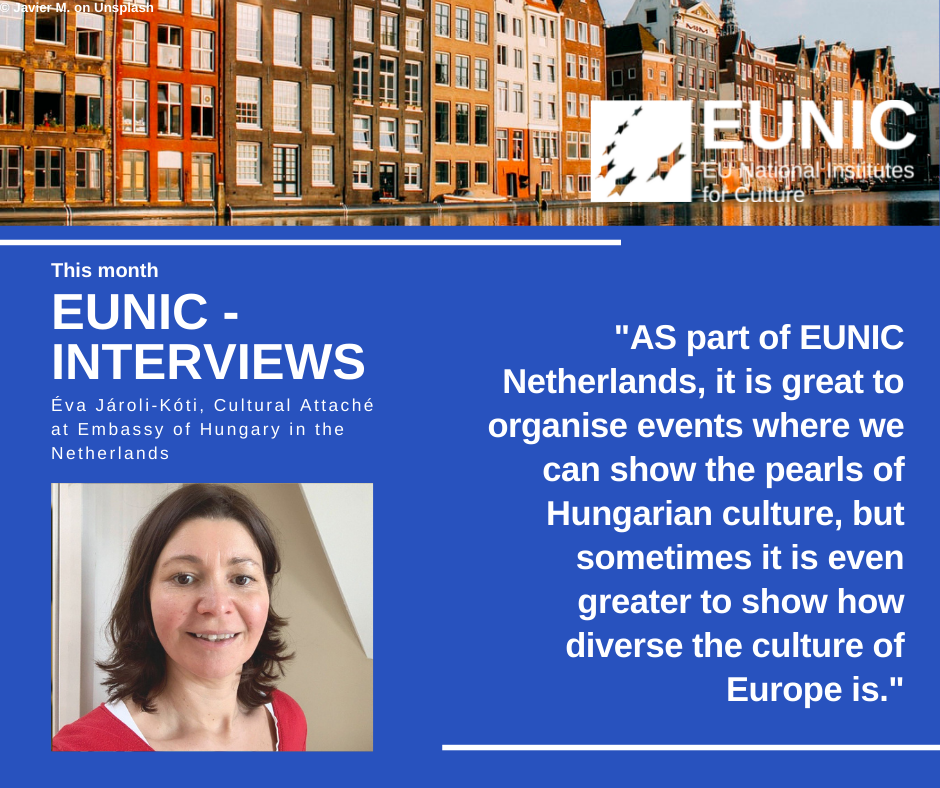
1) What role do you play in your institute/embassy?
As a diplomat at the Embassy of Hungary, I am responsible for culture, press and domestic politics. As a cultural attaché my goal is to strengthen Hungarian cultural diplomacy by promoting Hungarian culture in the Netherlands. This beautiful mission is very diverse: in some cases we promote Hungarian composers, artists, and musicians already known in the Netherlands and, in other cases, we help to discover new talents.
2) How do you contribute to EUNIC?
The Embassy of Hungary has been actively involved in the management of the EUNIC Netherlands cluster for many years. The current cultural manager, Nina Hauer, has been vice-president since 2019, and her predecessor was president for two years. I personally also participate actively in the work of the cluster; I am regularly involved in organising various projects related to the most various topics – from language to literature, from music to films.
For three years I have been one of the main organizers of the event organized by the EUNIC Netherlands cluster on European Day of Languages. The event aims to promote linguistic diversity as a tool for better intercultural understanding. Within this initiative, through workshops and speak-dates we introduce several European languages to secondary school students and the wider Dutch audience.
3) What is the best aspect about being a EUNIC Netherlands’ member?
The EU is about “unity in diversity”, and the EUNIC Netherlands cluster is an excellent reflection of this. We can learn a lot from each other by sharing best practices, and we can strongly support each other’s work and goals through our joint projects. Overall, it is great to organise events where we can show the pearls of Hungarian culture, but sometimes it is even greater to show how diverse the culture of Europe is.
Thank you, Éva Jároli-Kóti, for your precious insight on what it means to you to be part of EUNIC Netherlands.
Surf on our website to have a look at all the cultural events that EUNIC and its Members have organised for this busy, exciting month.
Interview with Dicle Gülşahin (DutchCulture)
Have you been wondering how heterogeneous and multicultural is our Cluster here in the Netherlands? Did you know that our scope, projects and inputs fall way beyond the borders of the EU? Keep reading the new EUNIC – Interview of the month and learn more about our Dicle Gülşahin and her role in EUNIC Netherlands 🇳🇱🇪🇺
Dicle is not only one of the youngest members of our team, but she is also our newest recruit. Her educational background in public administration combined with arts and cultural management both in Turkey and Italy is a great added value to our group, and to her team in DutchCulture.
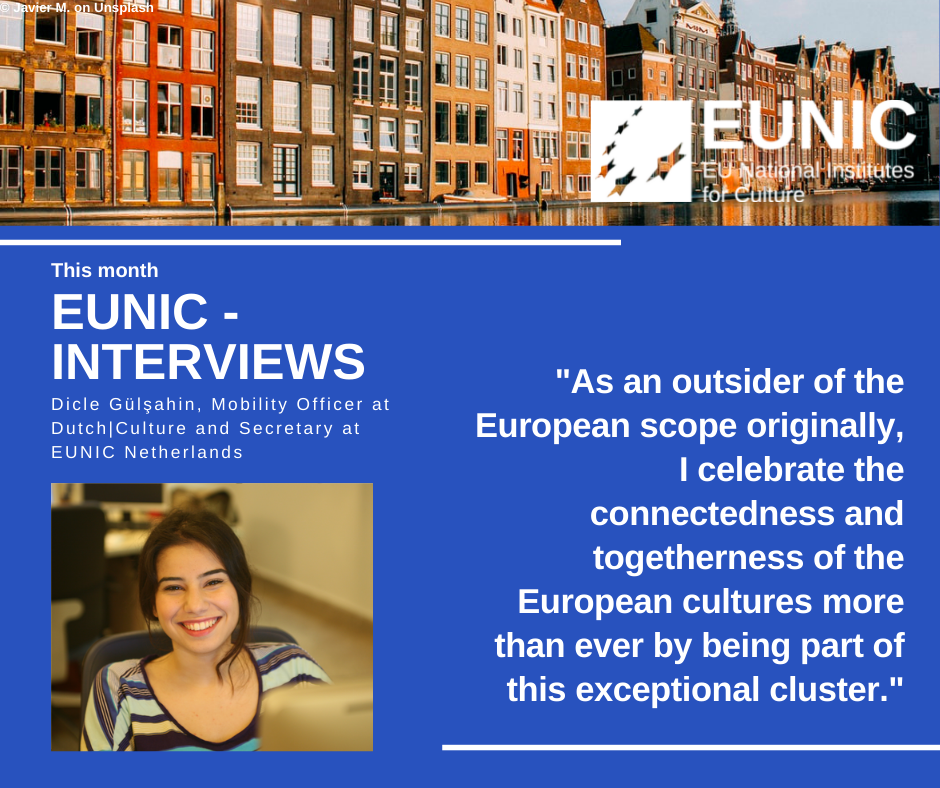
1) What role do you play in your institute/embassy?
DutchCulture is a knowledge and network organization for international cultural cooperation. My role as a mobility officer is providing the right information for artistic mobility. I am specifically responsible for the online content of TransArtists, the largest artist residencies database hosted by DutchCulture. I provide and manage data about artist residencies in many forms, including compiling the funded opportunities available in the Netherlands for the latest edition of the Dutch Cultural Mobility Funding Guide. In May 2021, I was appointed as the Secretary of EUNIC Netherlands, for which DutchCulture is the Dutch representative handling the secretariat of the cluster.
2) How do you contribute to EUNIC?
Being in the Secretary of the cluster, I am responsible for administrative tasks. I follow up the financial transactions together with the finances department, and I am responsible for the archive. This enables me to understand the overall goal and stance of EUNIC, and to appreciate the value of each project conducted with a collective effort.
3) What is the best aspect about being a EUNIC Netherlands’ member?
As an outsider of the European scope originally, I celebrate the connectedness and togetherness of the European cultures more than ever by being a part of this exceptional cluster. I believe that every project taking place within EUNIC Netherlands perfectly portrays the contemporary issues and needs of the European society from a local perspective. Each project team has a deep enthusiasm over their work, knowing that the end result will contribute to the future of Europe, guiding the next generations. The cluster also functions as a platform to discuss, reflect, and act upon the cultural context at a diplomatic level, which is an exceptional learning opportunity for a young professional who would like to gain expertise in cultural diplomacy.
Thank you, Dicle Gülşahin, for sharing your experience joining the Dutch cluster of EUNIC.
What will September bring to our Cluster? Who will be the next guest of EUNIC – Interviews during one of the busiest months for the cultural sector?
Interview with Paola Cordone (Istituto Italiano di Cultura)
Summer has arrived to the Netherlands, but our local EUNIC Cluster never stops. Neither do its members! EUNIC – Interviews is the ideal platform to introduce you our Italian colleague Paola Cordone, and the beautiful cultural events she is involved with during this warm season 🇮🇹🇳🇱🇪🇺
What kind of projects is Paola working on since she became the Director of the Istituto Italiano di Cultura Amsterdam? What changed in her professional experience since the outbreak of the pandemic? How did she like her arrival to Amsterdam early this year?
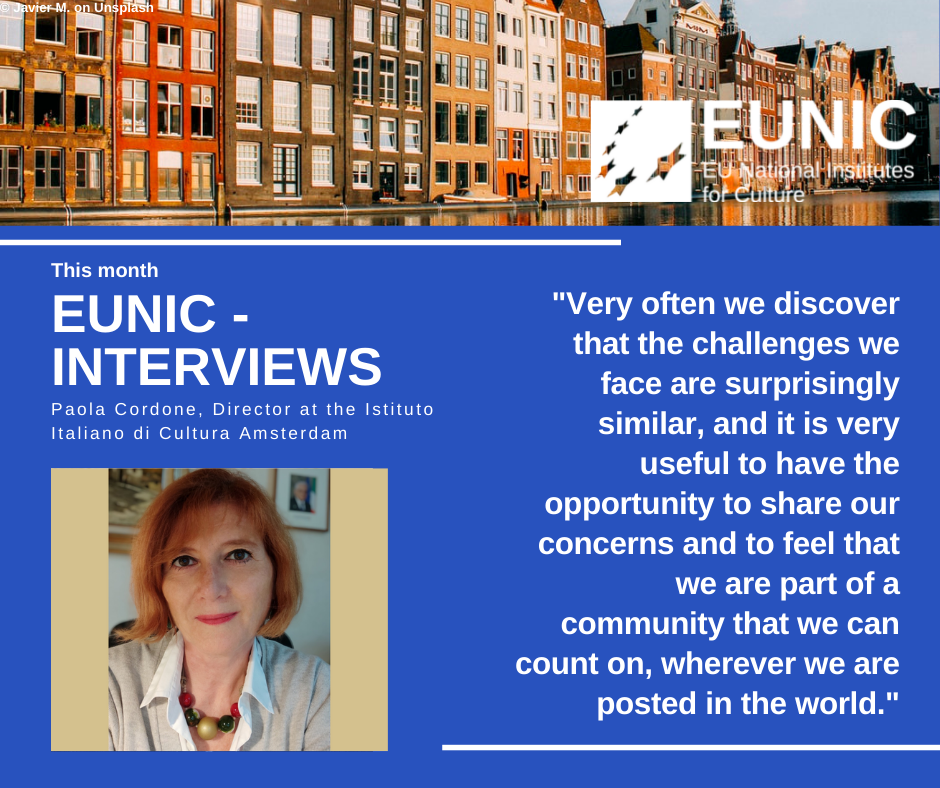
1) What role do you play in your institute/embassy?
I am the Director of the Istituto Italiano di Cultura di Amsterdam, which is part of a network of 83 Italian Cultural Institutes in the world. The Italian Institutes depend from the Ministry of Foreign Affairs and International Cooperation of Italy and, therefore, we are part of the Italian diplomatic mission to the Netherlands, led by the Embassy of Italy. The Institutes’ mission is to promote the Italian language and culture, both classic and contemporary. We do so by offering courses of Italian language and by organizing events which focus on various cultural sectors, from literature to art, from music to cinema, from theatre to gastronomy.
An important aspect of our mission is to establish and enhance the collaboration between Italian institutions and artists with the numerous local partners. A good example of this cooperation is the exhibition that was inaugurated on July 10 in Den Haag, ‘Le latitudini dell’arte‘, organized by institutions and galleries of our two countries. Italian contemporary artists could exhibit their works together with artists living in the Netherlands, giving rise to a fruitful artistic dialogue. The Italian Cultural Institute is located in a fascinating historical building in Amsterdam in Keizersgracht and I hope that soon, if the sanitary situation keeps improving, we will be able to welcome anyone wishing to learn Italian or visit our library or attend the events that we will propose.
2) How do you contribute to EUNIC?
I arrived in Amsterdam very recently and I haven’t had the chance to follow from the beginning the initiatives organized by EUNIC for this year; nevertheless, the Italian Institute participated to the European Literature Night 2021, which took place on June 19 and was a great success, and we will be part of many more projects. The EUNIC meetings to which I participated so far were very interesting: EUNIC Netherlands is a big cluster and the first impression I got is that all the participants seem very active, dynamic, and friendly.
3) What is the best aspect about being a EUNIC Netherlands’ member?
I arrived in Amsterdam last March and, due to the Covid-19 restrictions, so far I have not had the opportunity to know many people or visit many cultural centres. I had a chance to see the colleagues online via Zoom meetings, but I am now really looking forward to get to know them ‘live’. In my experience, it is very important to be able to meet, exchange ideas, competences, strengths, or talk about the problems we have to deal with in our job. Very often we discover that the challenges we face are surprisingly similar, and it is very useful to have the opportunity to share our concerns and to feel that we are part of a community that we can count on, wherever we are posted in the world.
Thank you, Paola Cordone, for sharing your experience joining EUNIC Netherlands.
To what European country will our series of Interviews bring you in August?
Interview with Jana Kulevska Črepinko (Embassy of Slovenia)
For the much awaited beginning of summer, EUNIC – Interviews offers you an overview on the professional experience of one of our most active members: our Slovenian friend and colleague Jana Kulevska Črepinko 🇸🇮🇳🇱🇪🇺
What is Jana’s experience as Advisor for Economic and Cultural Affairs at the Embassy of Slovenia in The Hague? And what projects has she been working on as part of the EUNIC Netherlands team?
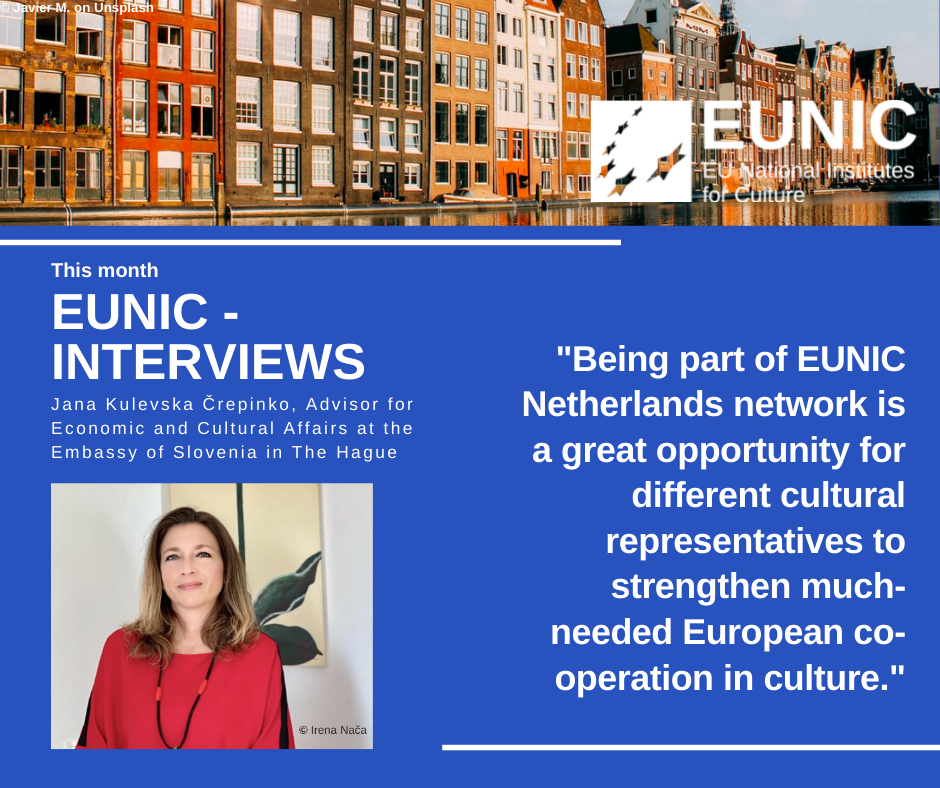
1) What role do you play in your institute/embassy?
At the Embassy of Slovenia in The Hague, I am responsible for economic and cultural affairs. I also assist the diplomats in various key areas of their work, such as promoting Slovenian economic/business interests and tourism, providing a range of key consular services, and supporting the good relations between the Governments. Helping with promoting and raising awareness of several important Slovenian initiatives and projects, inter alia, World Bee Day, Slovenia-European Region of Gastronomy 2021 and Europe Readr, is part of my job as well.
Promoting Slovenian culture is an important segment of the Embassy’s work. We showcase Slovenian culture by organising projects, events and collaborations with Slovenian artists, writers, filmmakers, actors, cultural institutions, Friends of Slovenia Association and the Slovenian community. EUNIC Netherlands is an important platform for our promotional activities. At the same time, we are proud to have a diaspora, which makes a meaningful contribution to our country, whether they are raising awareness of our culture or creating a positive image of Slovenia worldwide.
2) How do you contribute to EUNIC?
The Ministry of Foreign Affairs of the Republic of Slovenia, with the Slovenian Representations abroad, strongly believes in EUNIC’s mission and actively promotes European cultural relations. The Embassy of Slovenia in The Hague is actively participating in many activities of the EUNIC Netherlands with the aim to present and promote Slovenian culture in the Netherlands, and to foster the European collaboration in culture. The European Literature Night and International Women’s Day celebration are good examples of this successful cooperation.
The Embassy of Slovenia, together with EUNIC Netherlands and local partners, co-ordinates the local implementation of the fantastic European project: “Europe Readr – the Future of Living”.
Europe Readr is a project initiated by the Ministry of Foreign Affairs of Slovenia on the occasion of the upcoming Slovenian Presidency of the Council of the EU (July-December 2021). Europe Readr is a freely accessible digital platform, providing a free edited selection of European literature on the overarching topic “Future of Living”. It will include works from all EU Member States in their original language (24 official languages), and translated to English. Under the slogan “Open a book for a better future”, the platform www.europereadr.eu will be launched on 1st July 2021. We teamed up with TU Delft Faculty of Architecture and the Built Environment, and its students will produce a Europe Readr urban open space for reading and dialogue. ‘Future of Living’ Pavilion will embark on its maiden voyage in September. It will be installed in the central library of Amsterdam Public Library (OBA), and later on continue its journey to other libraries around the Netherlands.
3) What is the best aspect about being a EUNIC Netherlands’ member?
Being part of EUNIC Netherlands network is a great opportunity for different cultural representatives to work together on diverse local cultural projects, and co-create a space for cultural dialogue and collaborations, thus strengthening much-needed European co-operation in culture.
Thank you Jana Kulevska Črepinko for your very insightful contribution!
Can you guess who will be our seventh guest next month?
Interview with Mikko Fritze (Goethe-Institut)
This month we go all the way to Germany: in May EUNIC – Interviews is glad to introduce you the Director of the Goethe-Institute Netherlands 🇩🇪🇳🇱🇪🇺
Keep reading to know more about Mikko Fritze and his experience as Director of the German Institute for Culture, and member of the Dutch Cluster of EUNIC.
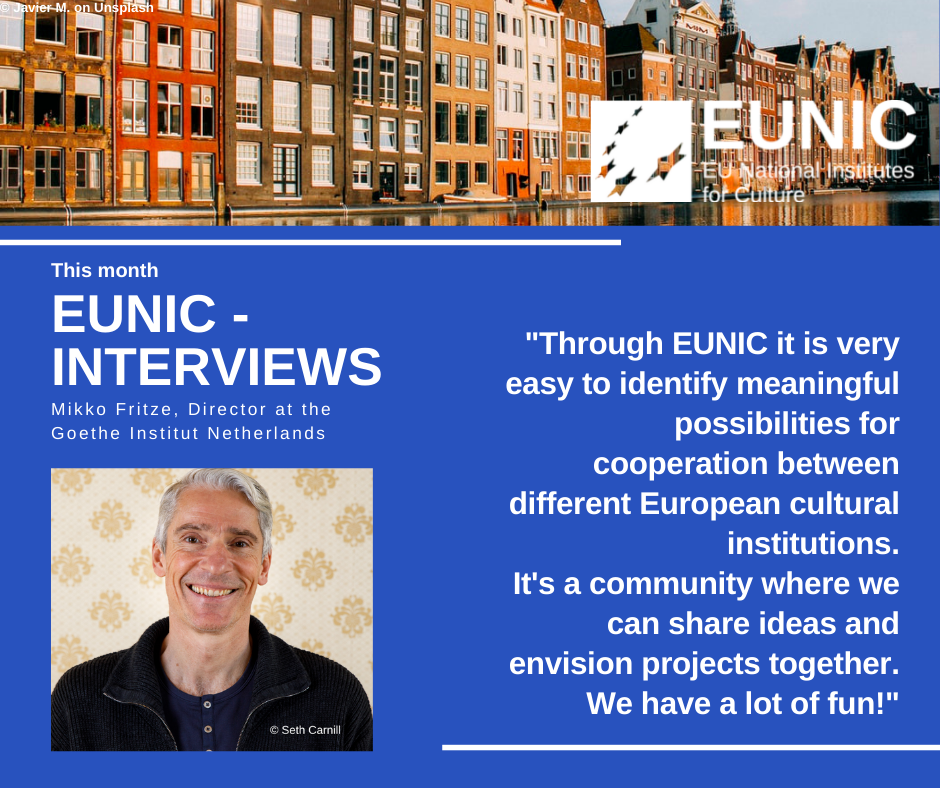
1) What role do you play in your institute/embassy?
I am the Director of the Goethe-Institut Netherlands. The Goethe-Institut is the cultural institute of the Federal Republic of Germany with a global reach. We promote knowledge of the German language abroad, foster international cultural cooperation, and convey a comprehensive image of Germany with 159 locations in 98 countries. Here in the Netherlands we have two locations: one in Amsterdam and one in Rotterdam.
2) How do you contribute to EUNIC?
Together we are sometimes stronger! Together, we find common European themes and synergies within our diverse cultural projects. We particpate in several projects in the cluster`s programme as, for example, the European Literature Night, or the event ‘Women & Music’. Furthermore, we enjoy the monthly exchange a lot. EUNIC is a vivid community where we can share ideas and envision projects together. We have a lot of fun!
3) What is the best aspect about being a EUNIC Netherlands’ member?
Through EUNIC it is very easy to identify meaningful possibilities for cooperation between very different European cultural Institutes or cultural departments of the Embassies. The regular meetings allow a fast decision making, and that enhances a meaningful exchange of ideas.
Thank you Mikko Fritze for sharing your experience within EUNIC Netherlands with us!
Interview with Sophie Logothetis (DutchCulture)
In April EUNIC – Interviews plays at home, bringing you to DutchCulture 🇳🇱🇪🇺
Do you want to know more about one of EUNIC Netherlands’ Board members, and Programme Manager for Europe for Citizens at Dutch Culture? Don’t miss our interview to Sophie Logothetis!
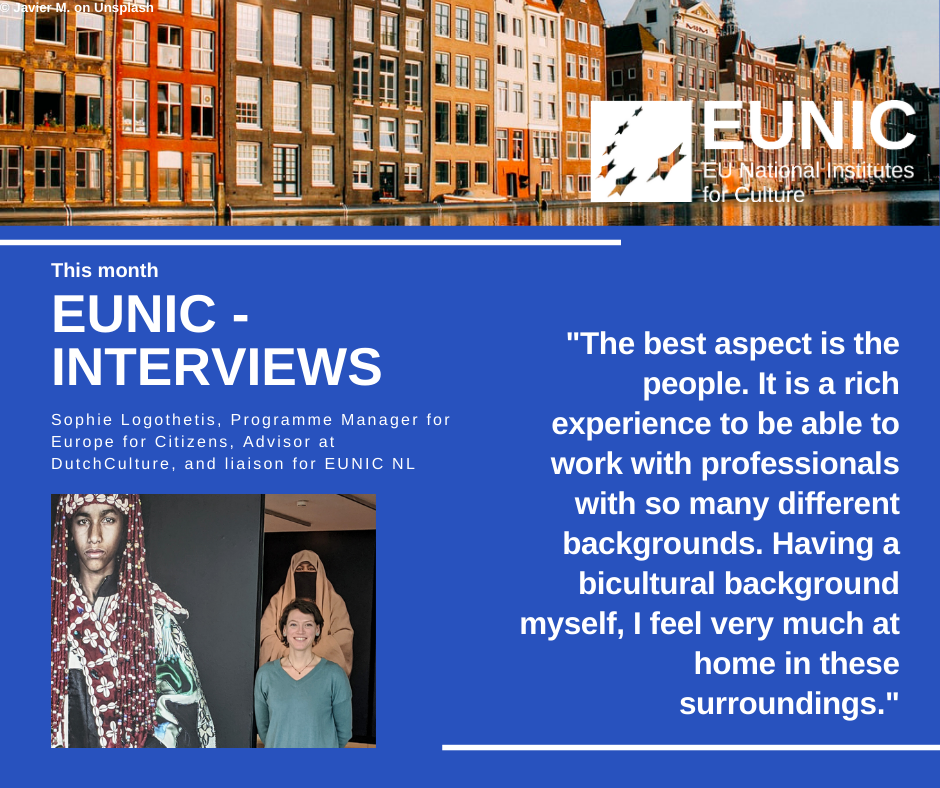
1) What role do you play in your institute/embassy?
For the last couple of years I have been the contactpoint of the Europe for Citizens programme in the Netherlands, hosted by DutchCulture. This is a EU finding programme, specifically aimed at civil society and municipalities in order to bridge the gap between the European citizen and the EU. I was responsible for the guidance of the Dutch beneficiaries. The Europe for Citizens programme was hosted by DutchCulture, the network and knowledge organization for international cultural cooperation where we maintain and enlarge our network and knowledge in order to help the Dutch cultural sector amplifying their voice in the international arena. This is where EUNIC comes in. Participation in the Dutch EUNIC cluster has been instrumental to this aim.
2) How do you contribute to EUNIC?
Being a member of the board of the Dutch EUNIC cluster provides many advantages. I get to know all the members very well and have a good overview of all the projects the EUNIC NL cluster is involved in. I also have the financial overview and have access to the EUNIC’s archive, which gives me a very insightful image of a small piece of European cultural history. I also have contributed actively to the annual European Literature Night, working closely together with the Forum on European Culture, the UvA and OBA.
3) What is the best aspect about being a EUNIC Netherlands’ member?
The best aspect is the people. It is a rich experience to be able to work with people with so many different backgrounds. Having a bicultural background myself, I feel very much at home in these surroundings. Apart from myself, I believe it’s a perfect fit for DutchCulture to have access to the network of EUNIC, in order to fulfill its goal, i.e. enlarging the cultural arena. Many projects and even friendships have developed being a member of this wonderful network.
Thank you Sophie Logothetis for your insights about being part of the big family of EUNIC Netherlands.
While waiting for our fifth guest of this EUNIC – Interview series, have a look at some of the projects Sohpie has bees involved with during her years at DutchCulture, such as the program Europe for Citizens, and her experience of job shadowing at the Institut für Auslandsbeziehungen in Stuttgart.
Interview with Pilar Tena (Instituto Cervantes)
This month EUNIC – Interviews brings you to the Instituto Cervantes in Utrecht 🇪🇸🇳🇱🇪🇺
Keep reading to know more about Pilar Tena and her role as Director of the Spanish National Institute for Culture in the Netherands.
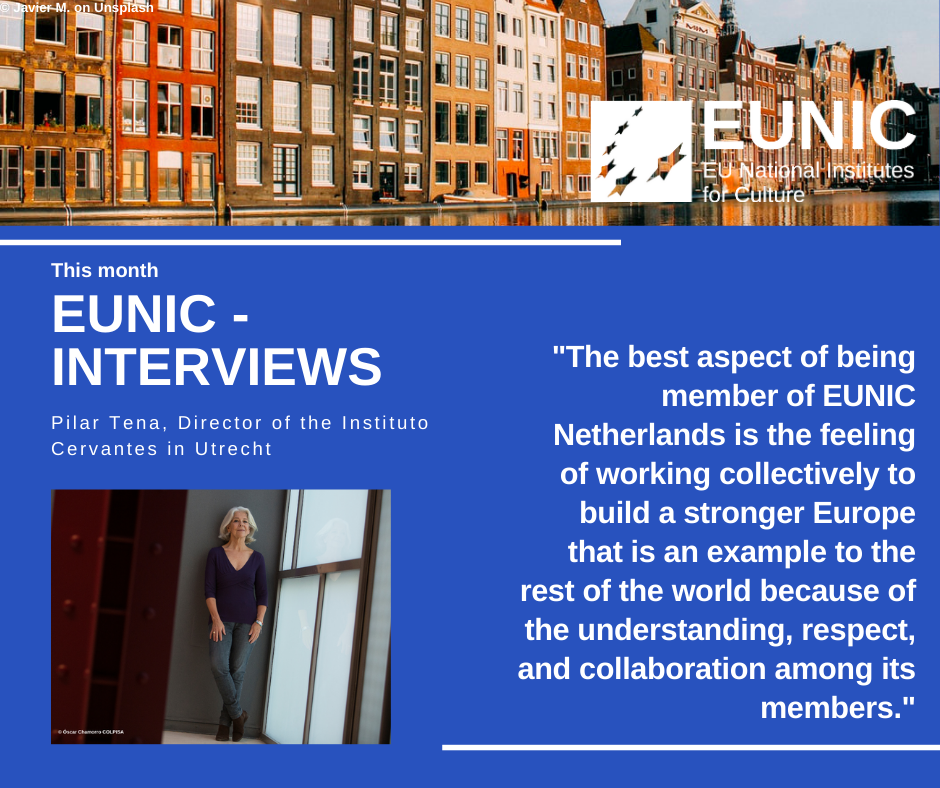
1) What role do you play in your institute/embassy?
I am the director of Instituto Cervantes in the Netherlands. We are part of an important network of institutes that expands over 45 countries and 85 cities. In this country, we have only one centre, based in a beautiful old building in Utrecht. Nevertheless, as the only Institute in the country, we cover the whole national territory. We are part of the Embassy and work in coordination with the Ambassador and our colleagues from the different Government departments, but due to the fact that we have our own building and the peculiar nature of our activity, we enjoy a certain autonomy. We basically teach Spanish and the other co-official languages of Spain, we administer the certification exams, and we organize a wide range of cultural activities throughout the country. At the moment we have two strategic priorities: the promotion of the teaching of Spanish and the expansion of our presence in the country with stable and focal activity points in different cities. We also want to continue to engage in a close collaboration with the most prestigious institutions in the country – museums, universities, publishers, festivals, etc.
2) How do you contribute to EUNIC?
At the Instituto Cervantes, we are firm believers in EUNIC’s mission. Our Director for International Relations at our headquarters in Madrid, Rafael Soriano, works incessantly with Brussels to strengthen the role of EUNIC worldwide and in particular to make the Spanish contribution relevant and active. As local directors, we are instructed and encouraged to participate in our clusters’ activities, and not only that but also to be proactive and to promote initiatives at a national level. Our last Secretary-general was Chairman of EUNIC not long ago, and we now have a Spanish Vice president. Since my arrival almost four years ago I have been active in the cluster, attending almost every meeting and trying to contribute to the cluster’s programme. We recently promoted an application for funds that was unfortunately not successful, and we are now coordinating, as we did last year, a fantastic project for International Women’s Day, where EUNIC NL and several of its members are active participants. This year, the theme “Women and music” has given us a fabulous opportunity to bring together our colleagues and work in a series of concerts taking place between January and May, a roundtable and several musical performances that we broadcasted on March 8, 2021, and a beautiful exhibition on international women composers coming from Vienna. A full programme!
3) What is the best aspect about being a EUNIC Netherlands’ member?
Working from Utrecht, it has been a fabulous opportunity for me to meet with my colleagues on a monthly basis: we have built a remarkable friendship and camaraderie. But of course, the best aspect is to have the feeling that we are working collectively to build a stronger Europe that is an example to the rest of the world because of the understanding, respect, and collaboration among its members, proving that we can, at the same time, enhance cultural and linguistic diversity in Europe, and increase awareness of a common European identity.
Thank you Pilar Tena for sharing your experience within EUNIC Netherlands!
While waiting for the second interview of this Spring, on the website of the Instituto Cervantes you can find some of the amazing projects Pilar has been working on, as “Vrouwen en Muziek”, an event organised to celebrate International Women’s Day.
Interview with Daria Bouwman (Austrian Embassy)
EUNIC – Interviews is back, this month reporting from the Austrian Embassy Den Haag 🇦🇹🇳🇱🇪🇺
Scroll down to read more about Daria Bouwman’s experience working as a Cultural Representative for the Embassy and as EUNIC Netherlands’ Director.
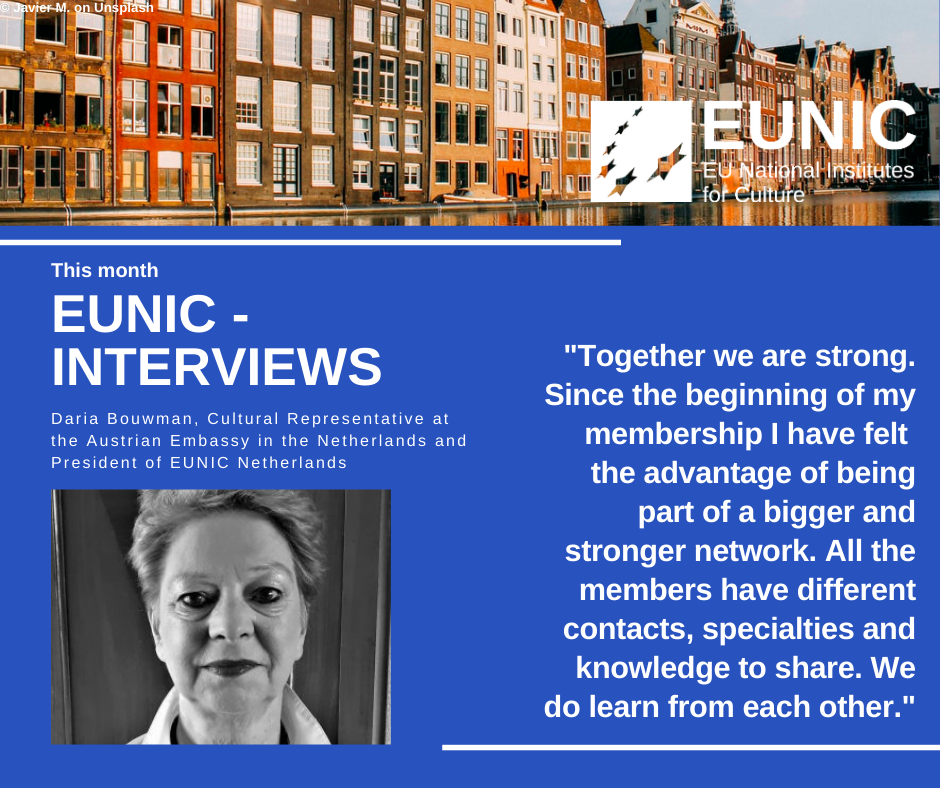
1) What role do you play in your institute/embassy?
I work at the Austrian Embassy in The Hague, as a local staff member and I am responsible for culture, education and science. Usually that means that I am organizing cultural events like concerts, lectures, debates and exhibitions, among others, to introduce Austrian culture in the Netherlands. I help Austrian artists finding partners in the Netherlands and similarly I help Dutch organizations finding Austrian artists. It’s always a pleasure when you find the perfect match for Austrian and Dutch artists and to witness what the Austrian art scene has to offer to the Netherlands.
2) How do you contribute to EUNIC?
I have been a member of EUNIC Netherlands since 2006, when we started as a small team of enthusiastic deputies from some EU-countries, years before we officially founded EUNIC-NL. Since then it has been my pleasure to contribute to several projects. I am fascinated by the cultural diversity of Europe and I am always eager to show that to the Dutch audience.I have been president of EUNIC for more than a year now and I have been responsible, among other things, for coordinating our projects in cooperation with local partners.At the moment – in collaboration with the European Commission Representation in the Netherlands and OBA Amsterdam – I’m organizing a series of lecture about the different aspects of “Multilingualism” including multilingual education and film and subtitles.
3) What is the best aspect about being a EUNIC Netherlands’ member?
Together we are strong. Since the beginning of my membership I have felt the advantage of being part of a bigger and stronger network. All the members have different contacts, specialties and knowledge to share. We do learn from each other. Sometimes it is difficult to get sufficient funding for cultural projects, but together we can organize larger projects by joining forces. Furthermore, I love the insights I get into the cultural world of other European countries. I learn a lot of new things. And the exchange of experiences with European colleagues enriches my professional and private life. And especially in corona-times: Together we are still going strong.
Thank you Daria Bouwman for the interview!
Check out also our Interview from March! In the meanwhile, make sure to check out the next lecture on Multilingualism, “Expand your knowledge of language and culture through films and subtitling”, organized by Daria by visiting the following page.
Interview with Hélène Doub (Institut Français)
Launching for the first time this week, EUNIC – Interviews will, over the next months, be reporting member organizations representatives’ own stories. First up is, Hélène Doub, cultural attaché and deputy director from the Institut français des Pays-Bas 🇫🇷🇳🇱🇪🇺
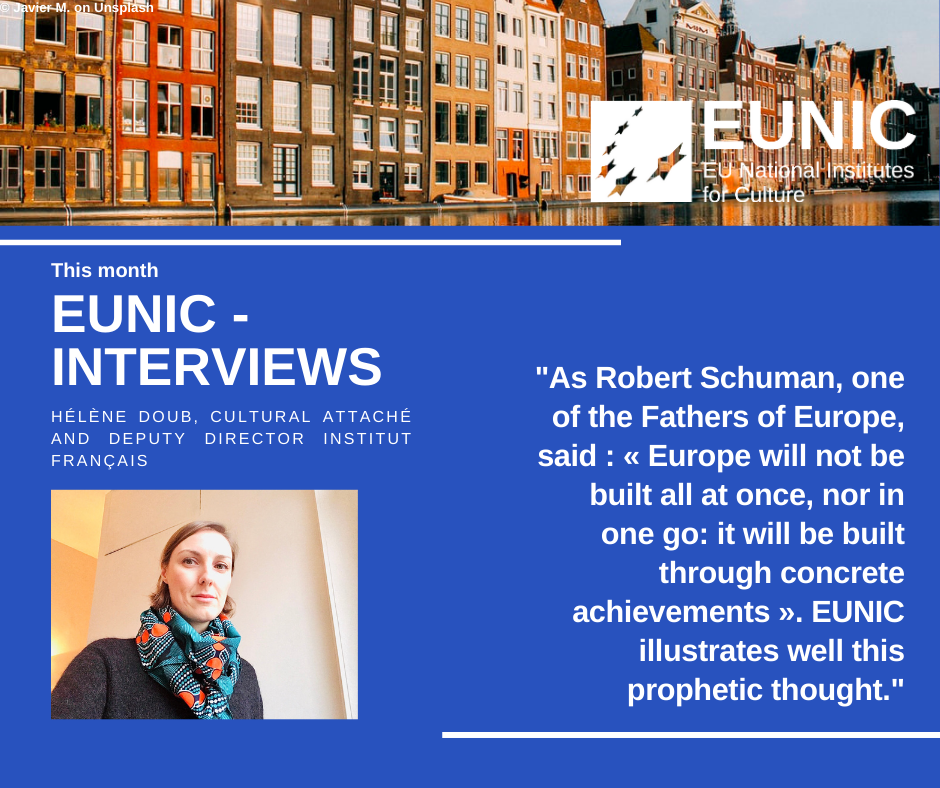
1) What role do you play in your institute/embassy?
Since 2018, I have been a Cultural Attaché at the French embassy in the Hague and Deputy director of the Institut français des Pays-Bas. I am based in Amsterdam but my activity covers The Netherlands. My role is to foster cultural cooperation between France and The Netherlands at a bilateral but also at a multilateral level. In concrete terms, together with my team, we organize cultural events in cooperation with Dutch or European partners; we stimulate a network of cultural actors who work with French artists or thinkers; we build bridges between the French cultural scene and its Dutch partners and we support, in financial, technical and communication terms, the efforts made by our partners to promote the French and francophone scene. But this also goes the other way round. We are doing a lot to encourage the emergence of a European sense of belonging through education, culture and multilingualism.
2) How do you contribute to EUNIC?
As a representative of one of EUNIC’s Members, the Institut français des Pays-Bas, but also as a European citizen, I take our main tasks as a EUNIC cluster seriously: improving and promoting cultural diversity and understanding between European societies and contributing to the definition of a European cultural policy which will endorse an independent voice for the cultural sector. Therefore, I participate actively in EUNIC Netherlands cluster’s meetings and events, and I contribute as a project coordinator with other members to the European Literature Night, which is one of EUNIC’s highlights during the cultural season. This brings me to make concrete steps every day alongside my European colleagues to set up a program and create a real dialog between diverse sensibilities.
3) What is the best aspect about being a EUNIC Netherlands’ member?
I had the chance to take part to several EUNIC clusters as a member or as a partner. Each time it was a very fruitful experience. Within EUNIC, members can enjoy a very collegial atmosphere. We learn how to take advantage from our diversity and become more conscious of our common grounds.What I really value within EUNIC is the opportunity to share experiences or good practices and to learn from each other. We all have very different backgrounds, sometimes also different priorities, but the quality of the dialog leads to fertile compromises.As Robert Schuman, one of the Fathers of Europe, said : « Europe will not be built all at once, nor in one go: it will be built through concrete achievements ». EUNIC illustrates well this prophetic thought.
Thank you Hélène Doub for your interview!


